Your local magazine from Islington Council • Autumn 2025
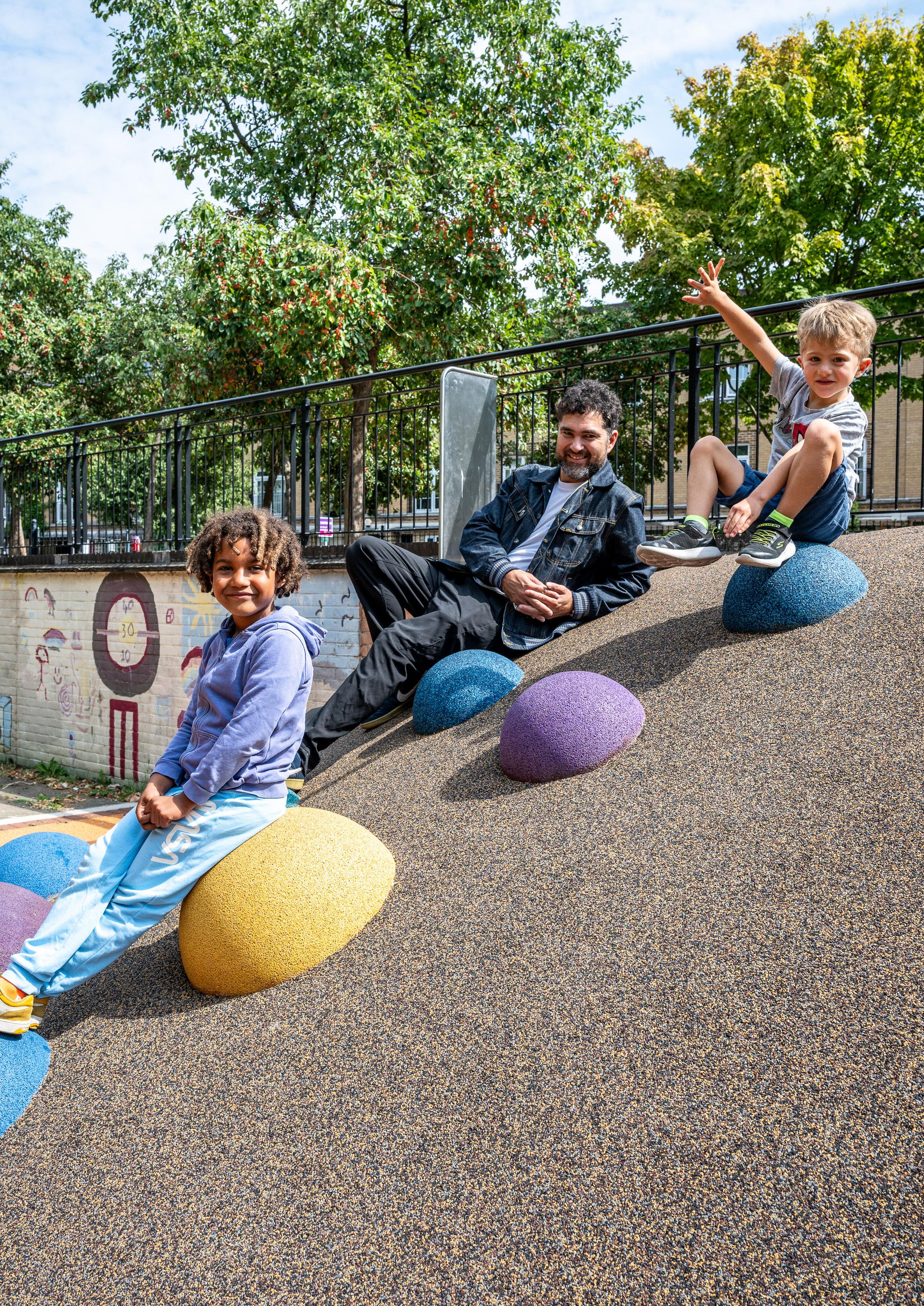
How local developers contribute to communities

Your local magazine from Islington Council • Autumn 2025

How local developers contribute to communities

Transforming estates and lives through gardening
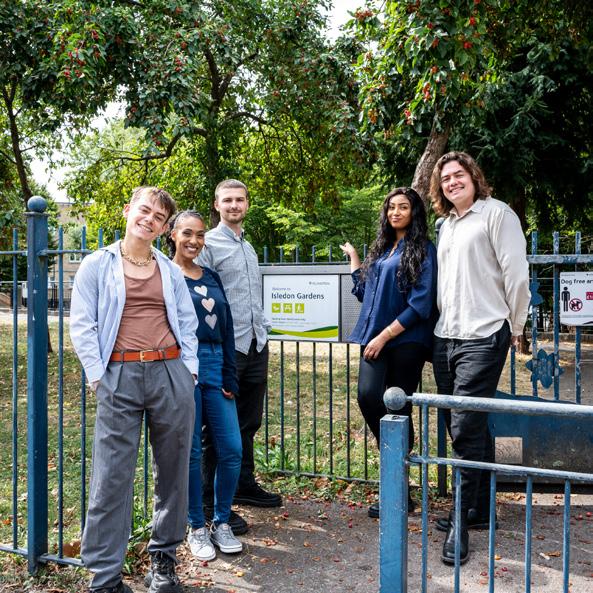

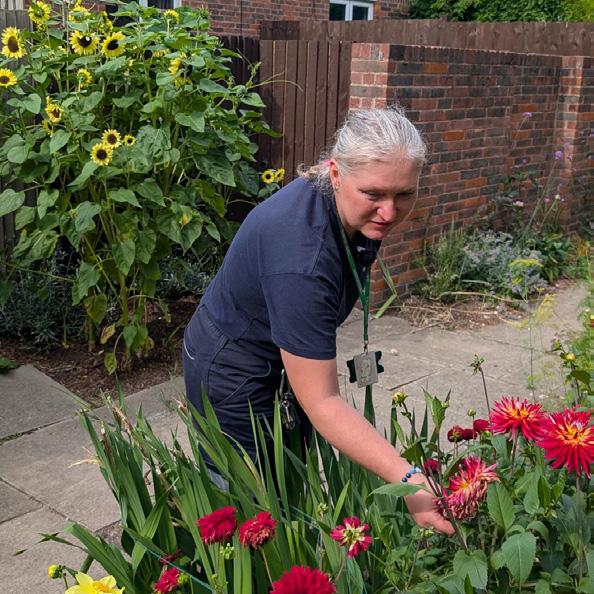
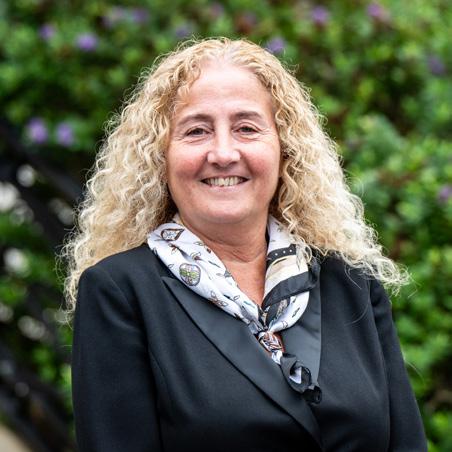
Cllr Una O’Halloran Leader of the council
View this and previous issues online at issuu.com/ IslingtonLifeMag
Be the first to hear about the latest news. Visit islingtonlife. london
Follow us on X @IslingtonBC
You can also find us on Facebook and Instagram. Search for Islington Council
Get in touch! Email us at IslingtonLife@islington.gov.uk
Recycle me! Please recycle this magazine once you’ve finished with it. If you would like IslingtonLife in large print, audiotape or another format, please call 020 7527 7301
Autumn always brings a moment to pause and reflect – and here in Islington, there’s plenty to feel proud of.
Over the past few months, I’ve had the pleasure of joining residents at some truly joyful events – from the vibrant Cally Fest, packed with music, dance, and poetry, to celebrating the achievements of our brilliant young people on A-Level results day. Their hard work and determination are a real inspiration.
I’ve also been proud to see the opening of seven new, stateof-the-art public toilets across our borough, helping to ensure that everyone - especially older people, disabled residents, and families with young children –can enjoy our public spaces.
People across Islington are doing their bit to make the borough a better place, and this edition of IslingtonLife is packed full of positive news.
In this magazine, we’re shining a light on how we’re investing in shared spaces. When developers build in Islington, they contribute to projects that benefit everyone – including improvements to parks, playgrounds, schools and estates. Isledon Gardens, which got a lovely makeover last year, is a great example of how this works in practice (p8) - with residents of all ages enjoying it over the summer.
And what a summer it’s been! Our four Chief Discovery Officers – local young people chosen to explore and celebrate all that Islington has to offer over the
summer holidays – share their reflections on p20. Their energy and curiosity are inspiring, and I’ve loved seeing their content across our social media channels over the last few months.
One of my favourite features is about a brilliant new art installation by local artist Freddie Yauner (p8), who’s working with the council to turn recycling into something truly eye-catching. It’s a reminder that small actions – like sorting our waste – can help build the greener, healthier Islington we all want to see.
We’re also marking the first year of Islington’s Black Cultural Centre (p23), a vibrant space for learning, creativity, and community. Over the past year, the site has offered a safe place for residents of Black African and Caribbean heritage to come together, supporting the council’s mission to tackle injustice and inequality.
Health and wellbeing are at the heart of this edition too. Marek’s story on p16 is a powerful one – after a decade of smoking, he’s now six months smokefree thanks to support from the Breathe stop smoking service. It’s a brilliant reminder that help is out there, and change is possible for all of us to live healthier, happier lives.
As the nights draw in and the air turns crisp, I hope this edition gives you a sense of pride in our borough – and plenty of reasons to feel hopeful for the season ahead.

To receive news and updates directly to your inbox visit islington.gov.uk/StayUpdated

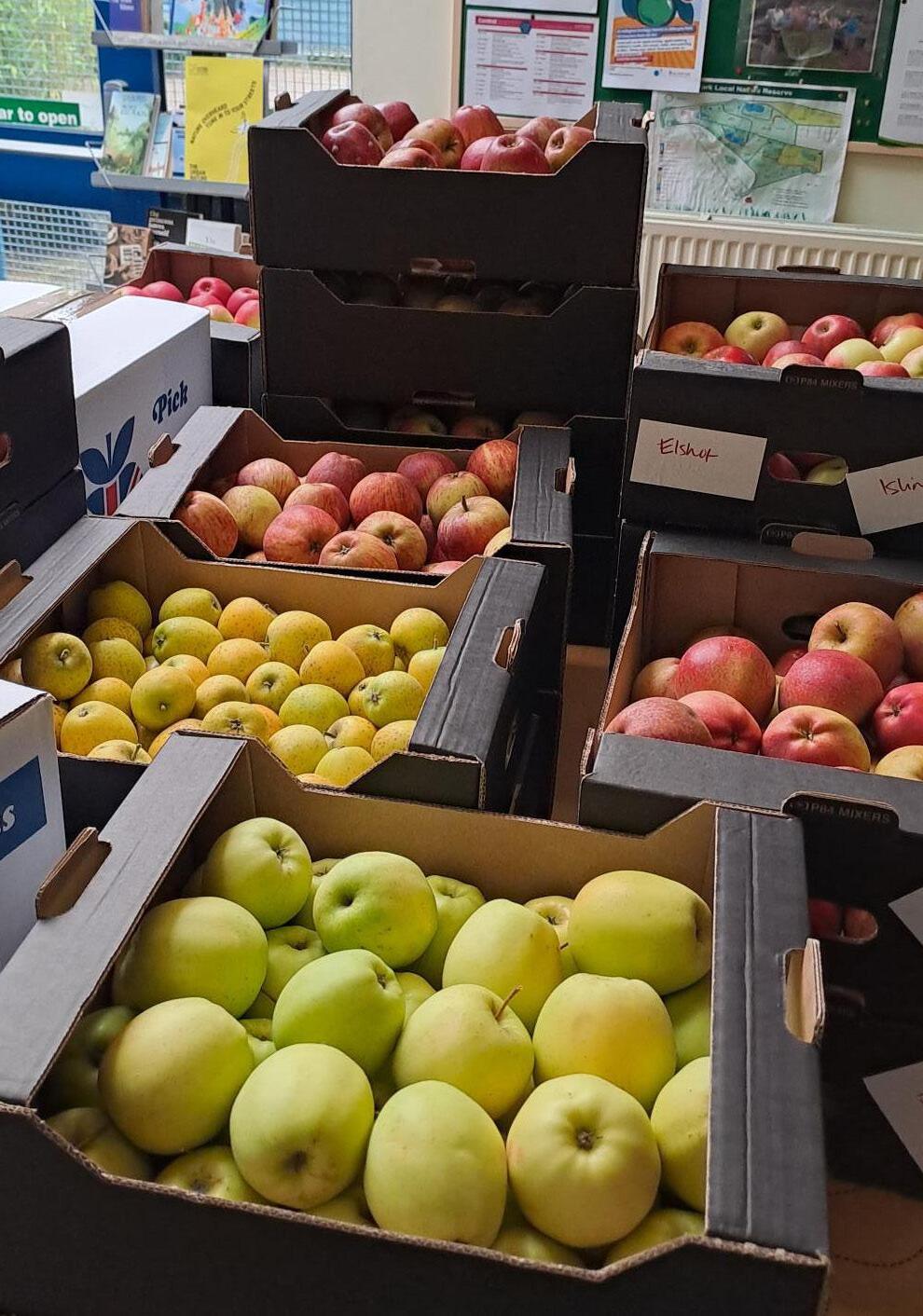
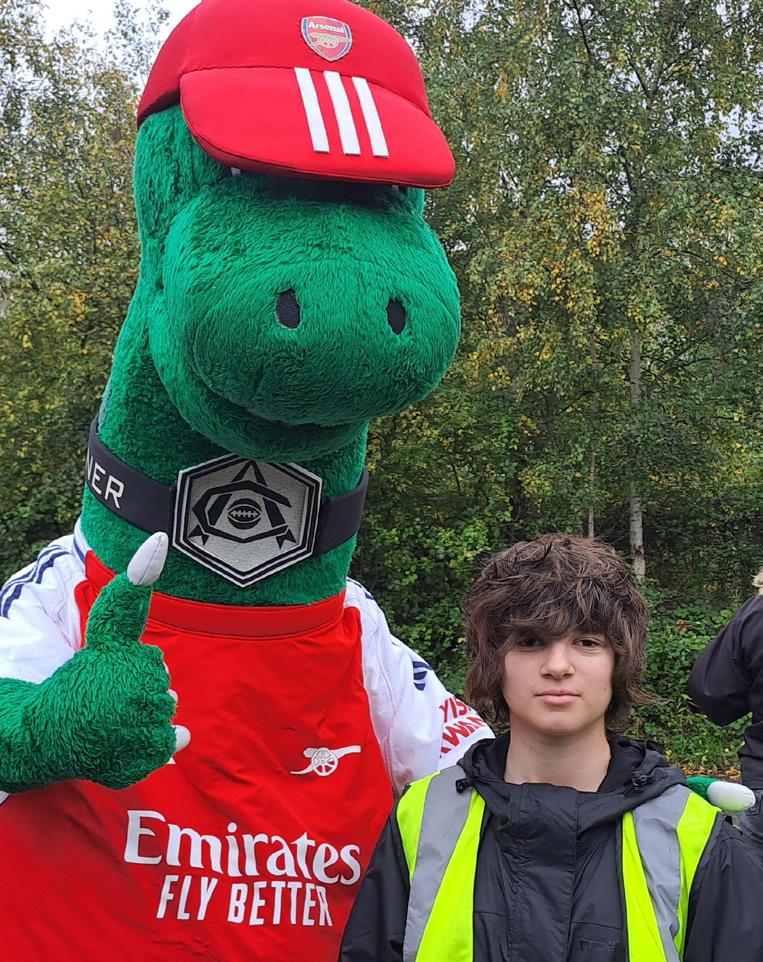
Apple Day returns to Gillespie Park on Sunday 19 October with live music, free kids’ activities and hundreds of apples to be pressed! Hosted by Islington Ecology Centre and the Friends of Gillespie Park, come along to this free, family-friendly community event and help make and taste fresh apple juice, listen to live local bands, get your bike fixed with Dr Bike. There’ll also be craft activities, plus stalls from local makers and charities. islingtonlife.london/AppleDay
Did you know you can pay your council tax online? You can pay a bill, set up a direct debit, and tell the council you’re moving online. Plus, by signing up for e-billing, you’ll automatically be entered into cash prize draws – with the opportunity to win up to £3,000.
islington.gov.uk/CouncilTax
Have you ever wondered what species that tree is on your road, or wanted to tell the council about a problem with a tree on your estate? Using the new map, you can search for any tree in Islington by postcode or location, find out more about it, and report an issue or ask a question.
trees.islington.gov.uk
Local council elections are due to take place in May 2026. To vote, you must register in advance. It is also a legal requirement for all voters to show an approved form of photo ID when voting at a polling station at elections. For the full list of valid ID and to register to vote, visit the Government website.
gov.uk/register-to-vote
Exciting news – the next round of the Thriving Neighbourhoods Programme launches in October! This time, the council
is focusing on small, low-cost projects that will make a big impact locally. Think secure bike parking, storage upgrades, better recycling, improved play areas, more greenery, or small security upgrades. Got an idea? Islington Council would love to hear it. Visit the website in October for full details and opening dates.
islington.gov.uk/ ThrivingNeighbourhoods
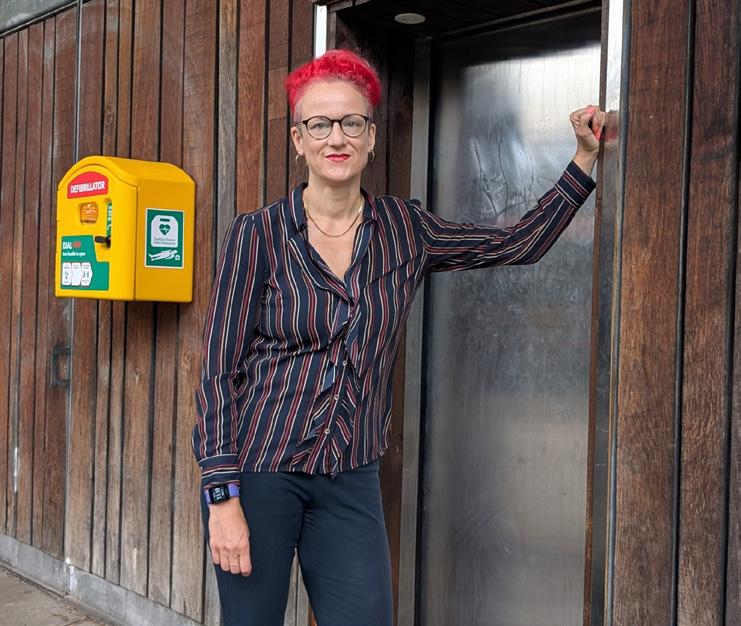
Seven new free, self-cleaning public toilets are opening 24 hours a day, seven days a week in key locations, including: Newington Green, City Road, Highbury Fields, Holloway Road, Seven Sisters Road, Highbury Crescent and Islington Green. These upgrades support dignity, inclusion and accessibility for all.
islington.gov.uk/roads/ public-toilets
Pop along to the Residents Get Involved Fair on 14 Oct 12noon–2.30pm at St Luke’s Community Centre for advice on everything from becoming a school governor to setting up a food co-op and volunteering. There’ll be free sandwiches, too! Registration required.
islingtonlife.london/ ResidentsGetInvolved

Black History Month kicks off on Tuesday 1 October with a flagraising at the Town Hall, led by our very own mayor. Look forward to a packed programme of events throughout October: from storytelling at Jean Stokes and author events at Islington libraries, to a Black Enterprise Expo at the Black Cultural Centre. Visit the IslingtonLife website for the full line-up and to book.
islingtonlife.london/ BlackHistoryMonth
This half-term, Islington’s libraries are celebrating Black History Month with a week of free, hands-on craft fun for all ages. Highlights also include storytelling with award-winning author Ifeoma Onyefulu. With drop-in sessions across libraries from 27–31 October, it’s the perfect chance to explore Black heritage through art and imagination.
islingtonlife.london/ LibrariesCrafts
We know, it’s a bit early to be talking about Christmas – but it’ll be here before we know it! This year Islington Council is putting on three festive events in Archway, Cally and Whitecross Street. Enjoy live music, festive carols, wreath making, facepainting and stalls from local businesses.
Santa will also be paying a special visit, handing out complimentary mince pies and toys! Keep an eye on the IslingtonLife website for dates and more details.
islingtonlife.london/ FestiveEvents
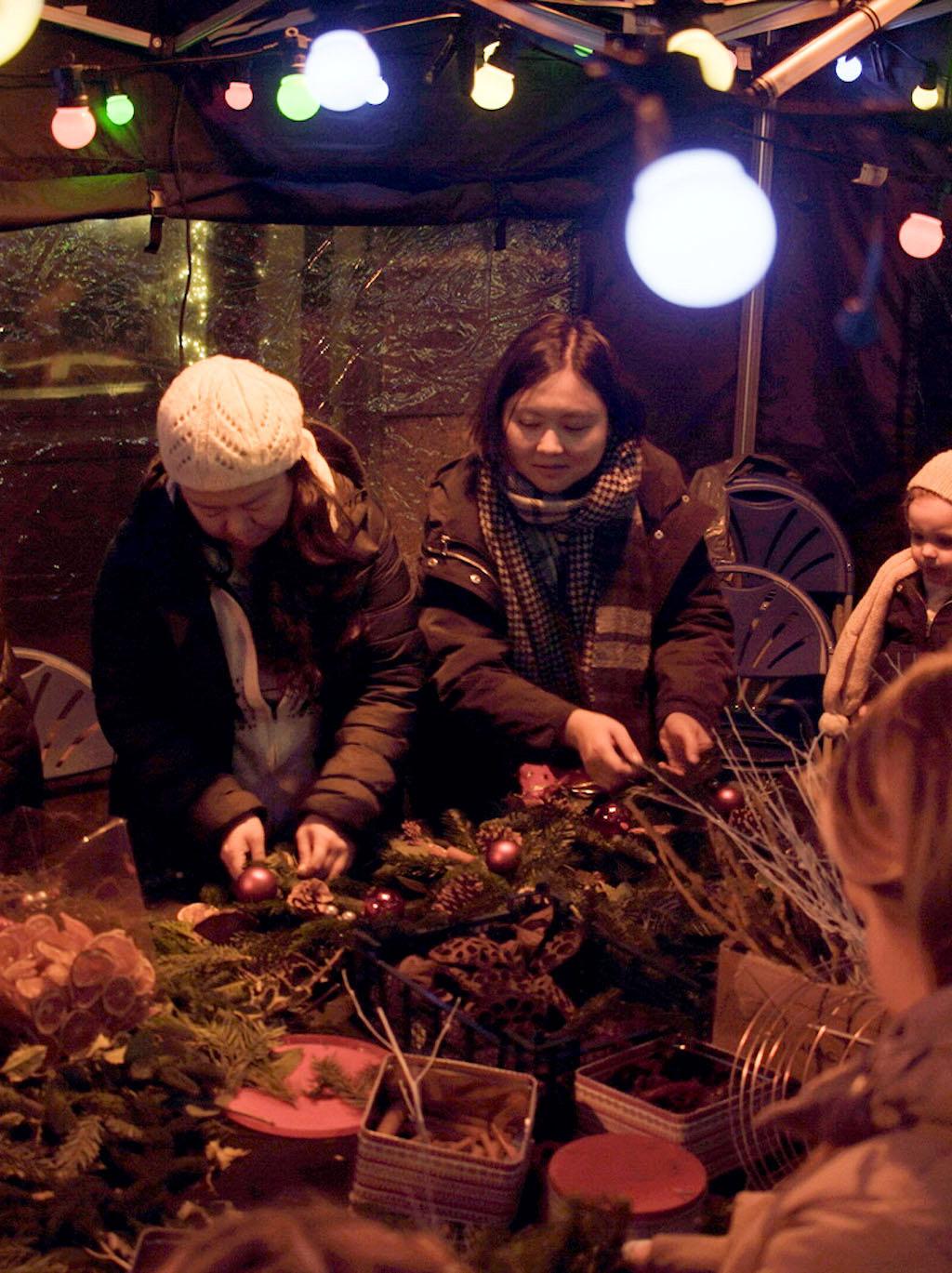
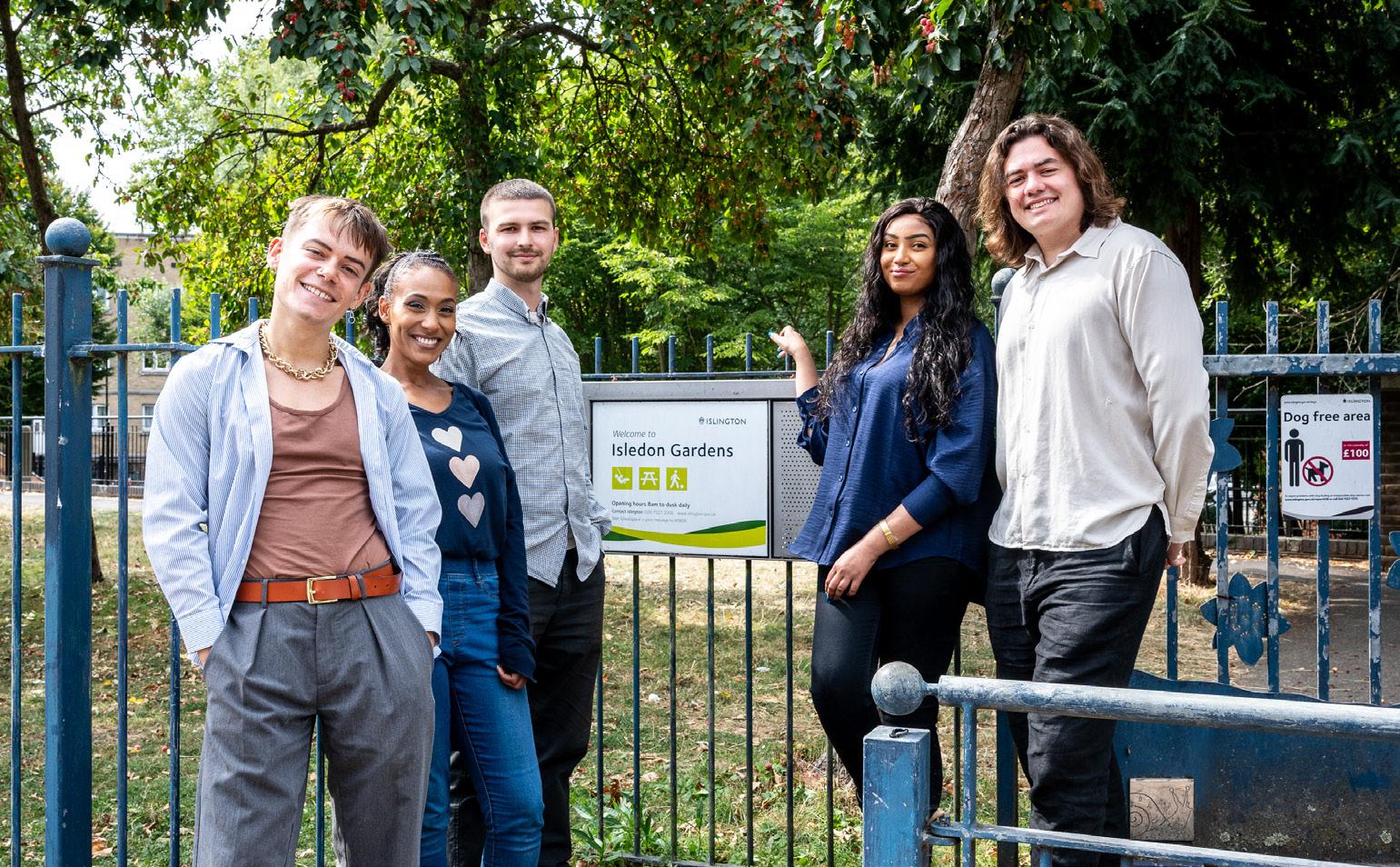
When property developers and housing associations build in the borough, they also contribute to our communities, funding projects like parks and improvements to local schools and estates. IslingtonLife finds out more
Every year, Islington Council works to ensure that new developments benefit the whole community – not just the people moving into them. Developers and not-forprofit housing associations that build in the borough are required to contribute to local improvements. These financial contributions fund things like parks, schools and transport, or environmental improvements. Non-financial contributions include things like making sure new housing developments are affordable and providing employment opportunities for local people as part of their work.
Together, these funds allow the council to invest in projects that make a real difference to residents’ lives. “We’re pleased to be working with the council to do something that makes a difference for local people,”
says Becky Leaman, senior development manager at notfor-profit housing association Peabody, which is behind one of the borough’s biggest housing projects at Holloway Park. “It’s good to see our significant contributions going back into the community, because for us this isn’t just about providing muchneeded new homes – it’s about creating opportunities.
“At Holloway, we’re training construction staff in green skills, helping people build new careers, and aiming for at least 30 percent of our construction apprenticeships to be for women, who are underrepresented in the industry. Our goal is to build a skilled, diverse team in construction – something that benefits local residents as well as Peabody,” she adds.
From upskilling staff and green skills training, it’s about empowering communities. “We’re building a skilled, diverse construction workforce, which ultimately benefits both residents and our business,” she continues.
“We see Islington residents as our neighbours, and we strive to be neighbourly – that means joining
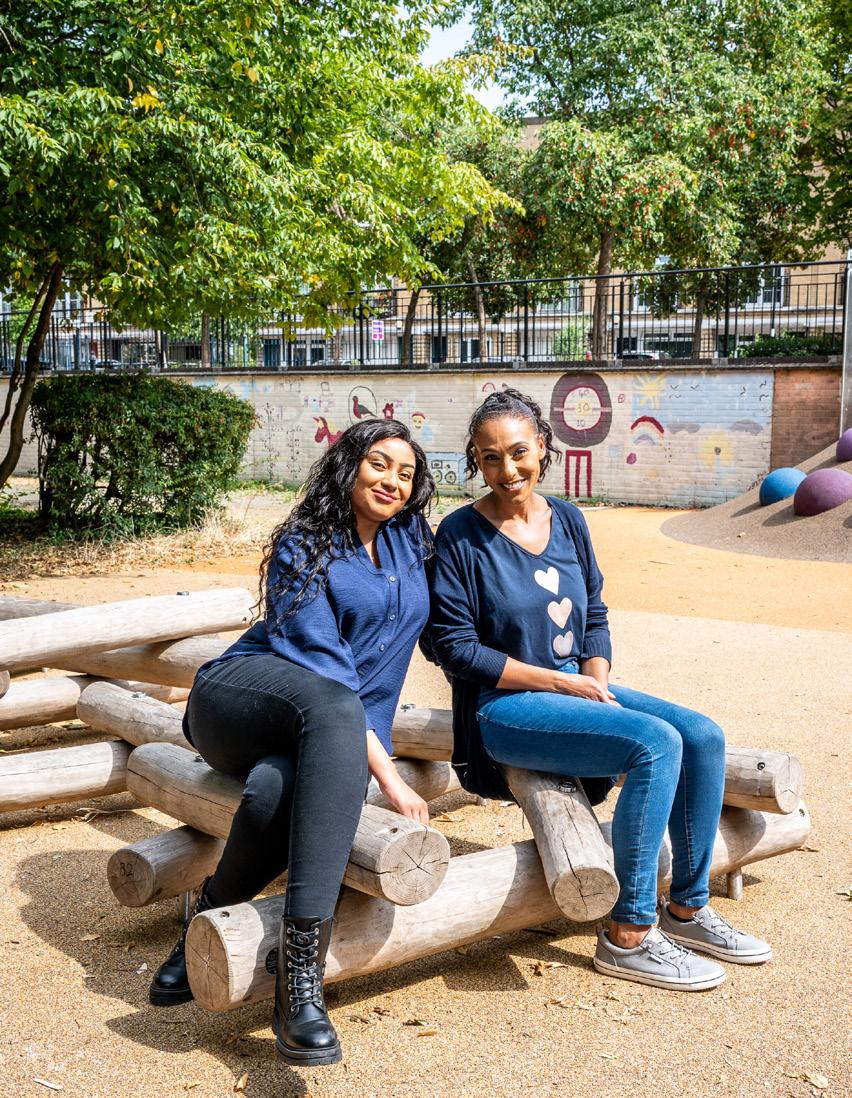
in the council’s mission to create a more equal Islington.”
From greener parks to better recycling facilities, below are three recent capital improvements that show how Islington is putting funding secured from developments around the borough to work:
Isledon Gardens: a new lease of life
Completed in November 2024, the transformation of Isledon Gardens in the Finsbury Park has turned a once-enclosed space into a welcoming green haven for local residents.
The sunken-walled garden –previously hidden from view –has been opened up thanks to the loweing of surrounding walls and improved sightlines across the park. Block paving was lifted and re-laid, and new plant beds were added to bring colour and biodiversity. A rain garden was introduced—an attractive, lowlying planted area designed to collect and absorb rainwater, improving drainage. It’s a simple but effective way to make our parks greener and more resilient
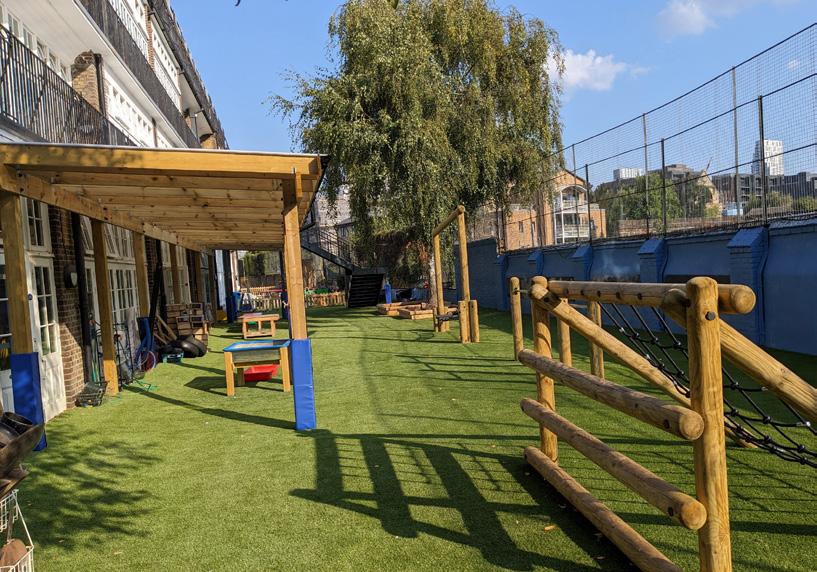
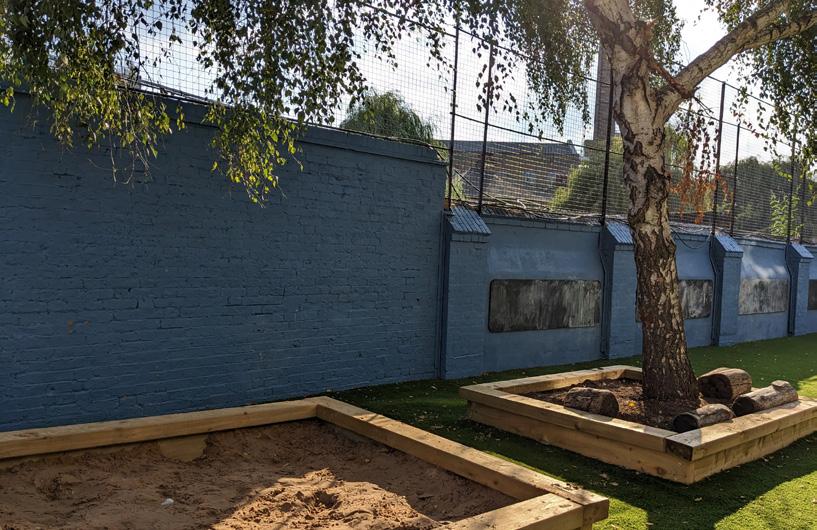
to heavy rainfall. Refurbished benches and trimmed shrubbery have made the space more accessible and inviting.
The play area also received a full makeover. Out went the old canopy and climbing frame, and in came a new play mound, slides, log scrambler and safety surfacing – creating a fun and safe environment for children.
These improvements reflect the council’s commitment to creating inclusive, high-quality public spaces. The redesigned park is already proving popular with families, dog walkers and residents of all ages.
Thornhill House: greener, cleaner, and more connected
Over in Barnsbury, the Thornhill House estate has seen a series of upgrades that are improving everyday life for residents.
The waste and recycling team recently completed new bin enclosures, increasing recycling capacity and making the area cleaner and more functional. The entire rear of the estate was resurfaced, and two old bin chambers are now being
converted into bike and pram shelters providing secure space for up to eight bikes and 10 prams.
But the improvements go beyond infrastructure. Gardening projects supported by the estate’s Tenants and Residents Association (TRA) have helped foster a stronger sense of community and wellbeing.
“The garden looks lovely and many people are not only gardening, but using the space to socialise, play and work from home,” said a spokesperson from the Thornhill House TRA. “A resident who stayed in her home is now planting and socialising.”
A further example of smart investment is the reimagining of bin chambers at Thornhill House. What were once underused spaces are now being transformed into practical, resident-friendly facilities.
Following consultation, two bin chambers are being converted into secure bike and pram storage, helping families and cyclists feel more supported in their day-to-day lives. Works began in July 2024 and are part of a wider programme of estate improvements funded through
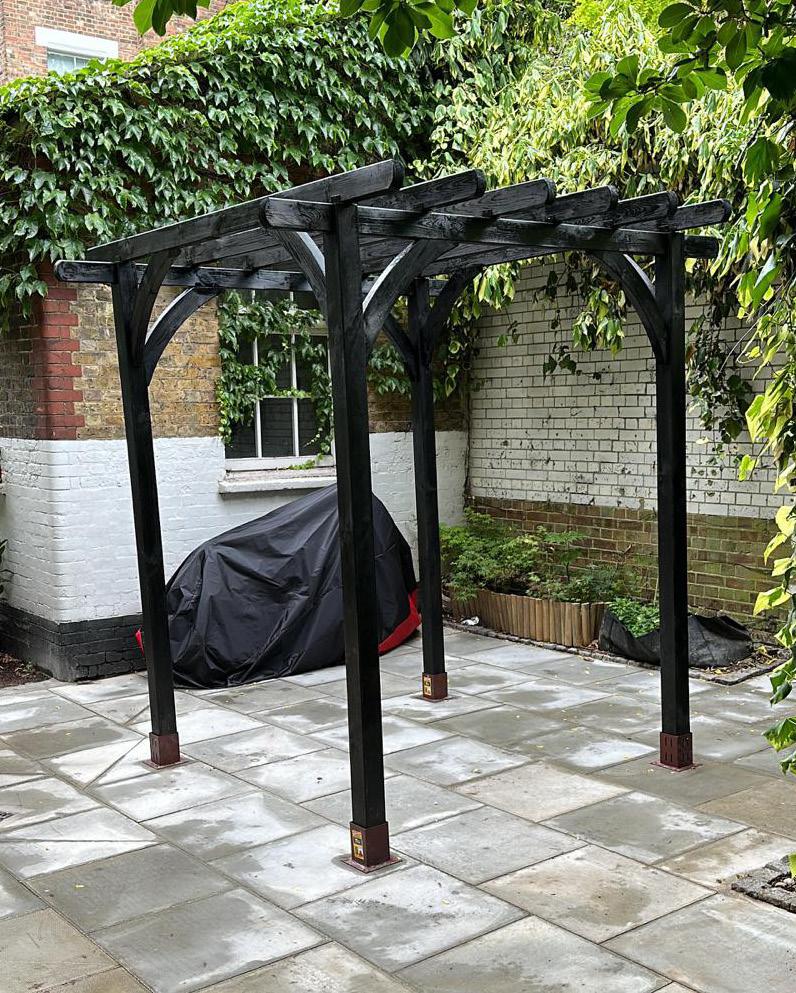
developer contributions. This kind of project shows how this funding can be used creatively to meet local needs, turning overlooked corners into valuable community assets.
In St Peter’s ward, Hanover School has benefited from a series of playground improvements completed in autumn 2024, designed to make outdoor play safer, more accessible and more enjoyable year-round.
The project included resurfacing the playground to improve safety, installation of new canopies to allow for all-weather play, as well as a new jungle gym and climbing frame.
These upgrades were delivered in close collaboration with school staff and ward councillors. The improvements have created a more exciting and inclusive environment for children, encouraging physical activity and imaginative play.
To learn more about developer funding and other projects happening across Islington, visit: islington.gov.uk/planning
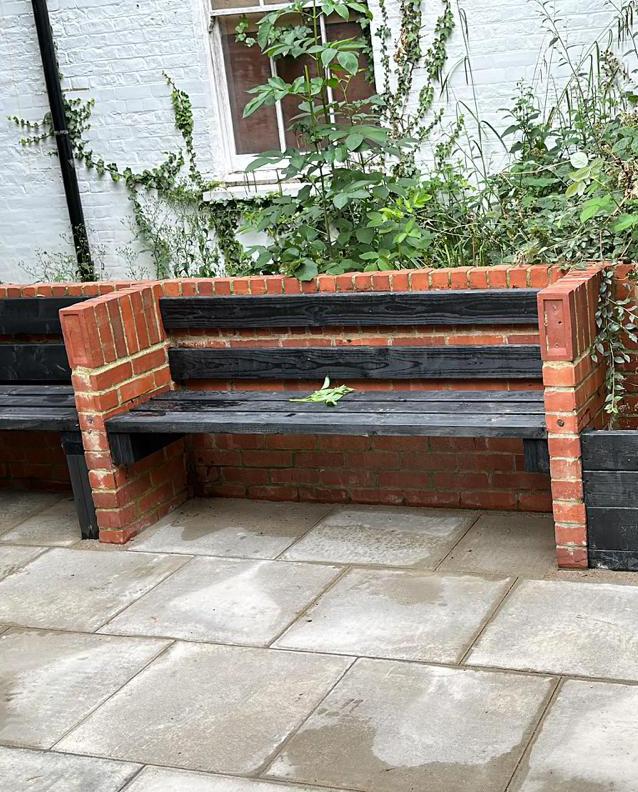
Freddie Yauner is Islington born and bred – an Arsenal fan and artist, who has a passion for sustainability and environmental issues. His work has been exhibited and collected internationally, and is included in several permanent collections, including at the Museum of Modern Art, New York.
We speak to Freddie about his upcoming project, which celebrates Islington residents who are doing their bit to recycle their waste, art in unexpected places and putting communities at the heart of his work
“My art has a social purpose,” says Freddie. “I’m really interested in making works with communities and through communities, to try to unpick some of the big issues in our world today –especially some of the things that can seem difficult to do, but actually we can all get involved in.”
Islington holds a special place in Freddie’s heart: “My primary school was just across the street from the Arsenal stadium. Being a fan is
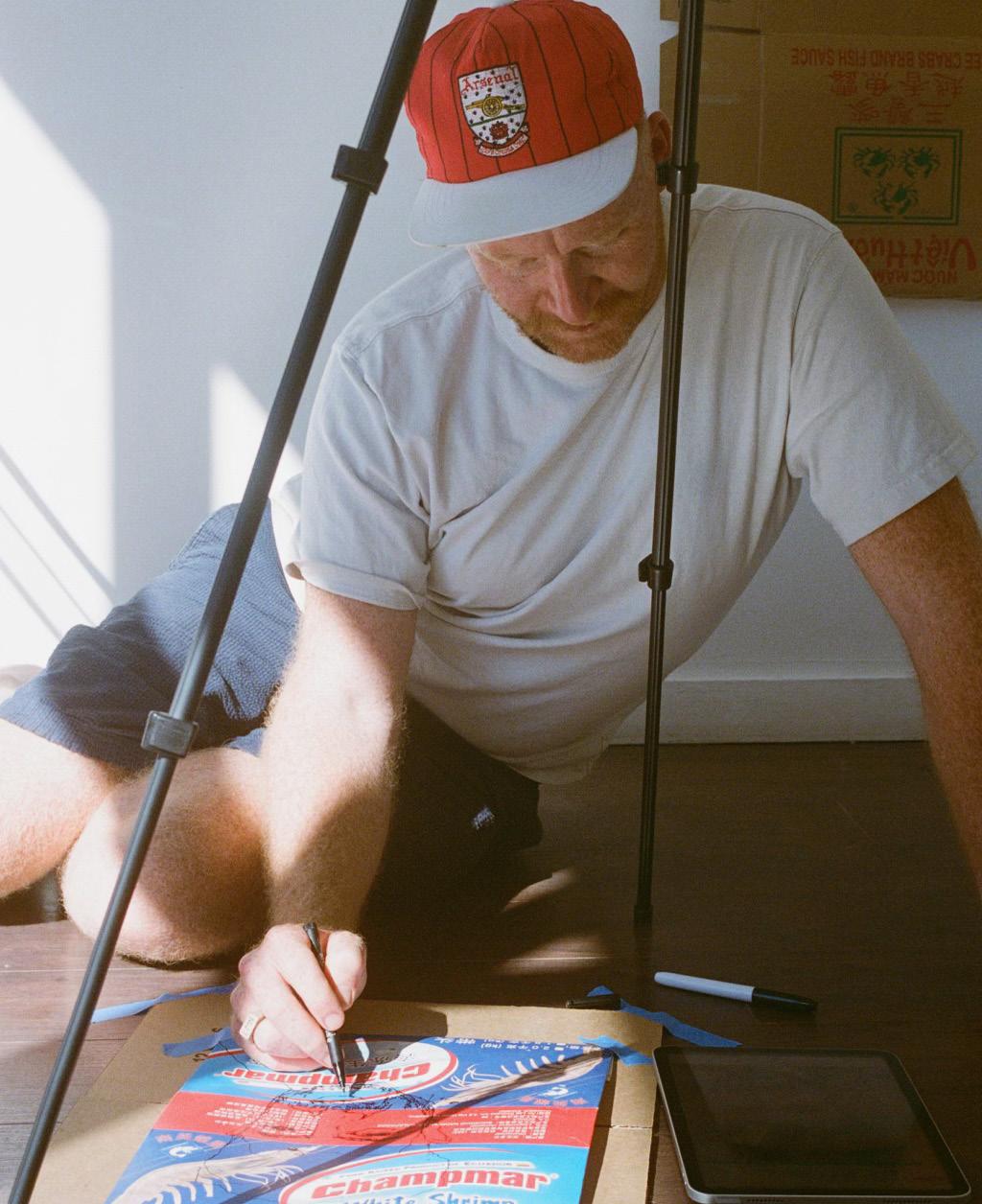
in my blood,” he laughs. So, when Islington Council approached him about working together on a recycling campaign, he jumped at the chance.
“Lots of people are already doing their bit to recycle. I’m really excited by research that shows that 89 percent of people are willing to do the things that need to be done to address the climate crisis. This
is really inspiring –people really want to do something about it,” Freddie continues. This project is about celebrating that. It’s exciting!”
In 2023 Freddie worked on a project with stallholders at Chapel Market, drawing their portraits on pieces of packaging that they used on their stalls.
“One of the main things I enjoyed about the
project was meeting the stall holders and having great – often Arsenal-related! – chats with them,” he explains. “Spending time with them, studying their faces and learning their lines, their eyes and their smiles – it was a really beautiful thing.” The work turned a piece of waste into a beautiful piece of art.
“I’m excited to work on this next project with
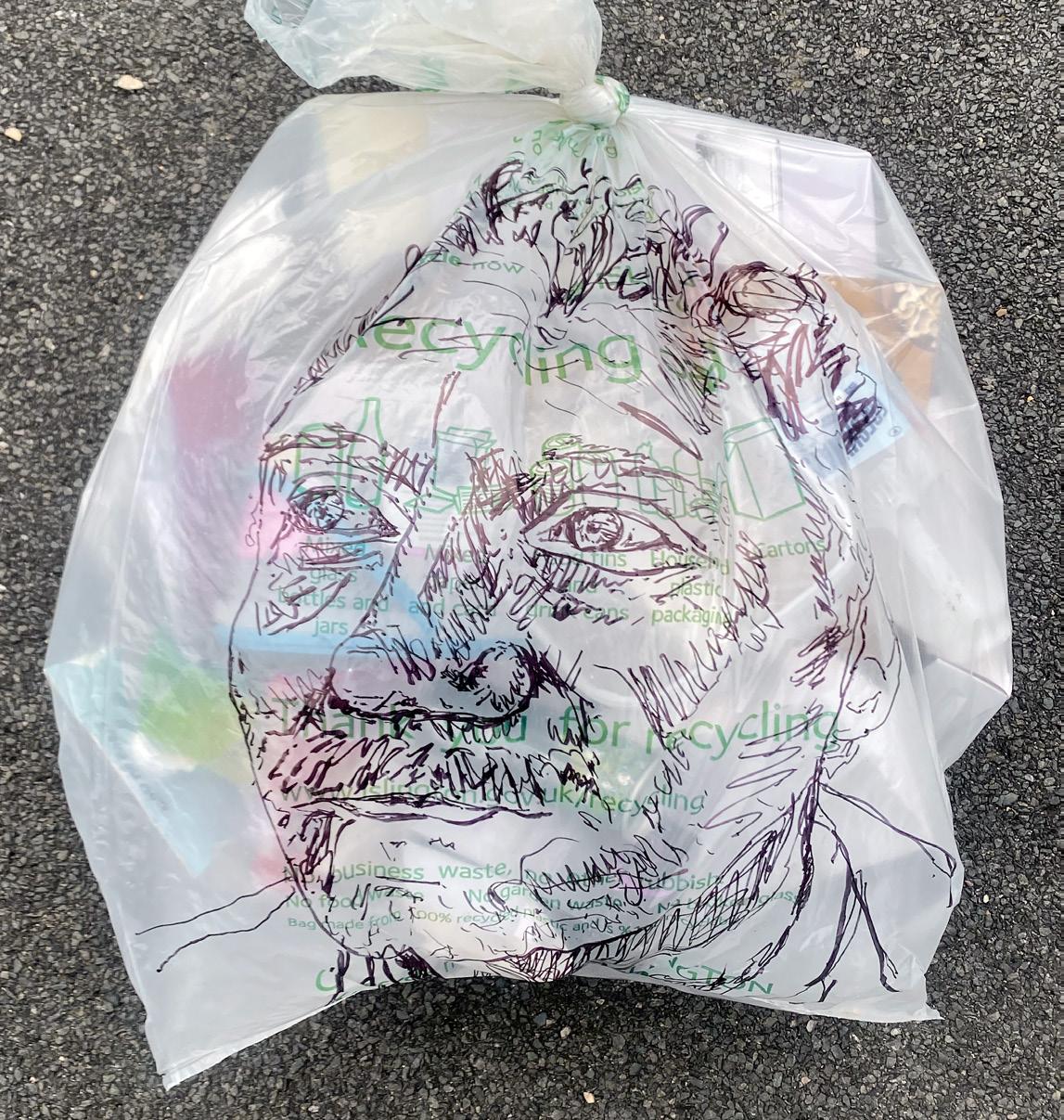
the council, and bring these personalities and artworks into unexpected places across the borough, celebrating these members of the community who are doing their bit.”
As part of the project, Freddie is interested in exploring the huge amount of packaging and waste that we all get through – but is keen to emphasise that it’s not about making people feel guilty.
“The responsibility of this is much further up the food chain. We didn’t ask for this waste: the supermarkets and places we buy our food are giving it to us, then leave us to deal with it,” he continues. “I’m trained in industrial design. Plastic is an incredible material – it just shouldn’t be put in the ground! The best

thing we can do with plastic packaging is rinse it and recycle it, so it can be reused and remade numerous times. It’s inspiring to know that we can all make a difference, and to celebrate the people who are doing something about it.”
To keep up to date on the art project, visit: islingtonlife.london/ things-to-do
Learn more about Freddie Yauner: freddieyauner.co.uk Or follow him on Instagram @freddieyauner
To learn more about recycling, including what you can and can’t recycle in Islington, book bulky waste collection or to order a food waste caddy, visit: islington.gov.uk/ recycling
Fact check: how much do you know about recycling in Islington? Did you know
The average Islington household produces around 349kg of waste each year – that’s about the same weight as an adult polar bear, or 50 watermelons! The good news is that about 30 percent of this already gets reused, recycled, or composted, and together we can make that number even higher.
By recycling the right way, we can make sure more of our waste gets a second life. For example, giving food containers a quick rinse or keeping greasy pizza boxes out of the recycling bin helps ensure materials can actually be recycled. Small actions like these really add up.
Remember not to use black bags for your recycling, as these can be mistaken for rubbish and thrown away. This simple thing makes a big difference.
Recycling doesn’t just help the environment – it also helps our community. It costs nearly twice as much to dispose of rubbish compared to recycling, so every item you recycle helps the council save money that can be spent on other vital services.
How affordable co-working spaces – made possible through agreements between developers and Islington Council – are helping independent local businesses thrive
Sarah, partnerships and social impact manager at Better Space affordable workspace
From the beginning, we’ve focused on social enterprises, charities, and startups, because we want to support people who are making a difference.
A big part of my role is thinking about how to build a community. We don’t just put people in the same building and hope for the best, it’s very intentional.
We run lunch-and-learns, socials, wellbeing sessions, and all sorts of events to help people connect. Members also give back two hours a month to support others, whether that’s mentoring, volunteering, or sharing their expertise. That’s what makes the space feel alive: people are here to do their own work, but they’re contributing to something bigger, too.
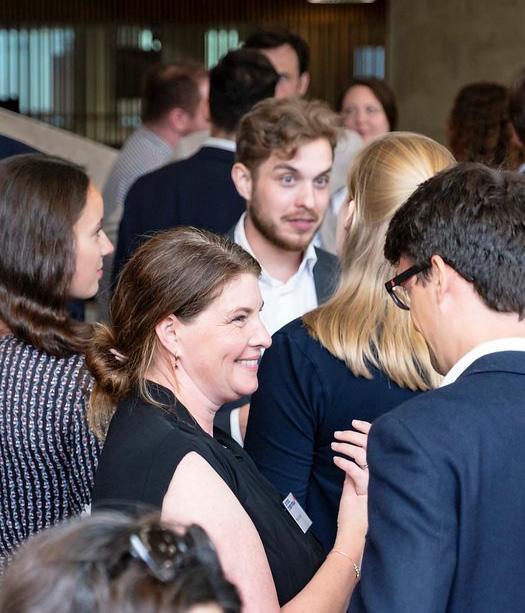
What I love most is that we’re rooted in Islington. We run hyperlocal projects, like helping create an edible orchard in a nearby park, but we’re also supported by the council and City and St George’s University. That mix of grassroots and big-picture support makes us unique.
Viv, founder and managing director of ADHD Babes at Space4
I set up ADHD Babes to fill the gap in UK services for people with ADHD and to fill the deep loneliness I felt after being diagnosed in my twenties.
We support Black women and non-binary people with ADHD. We also raise awareness about
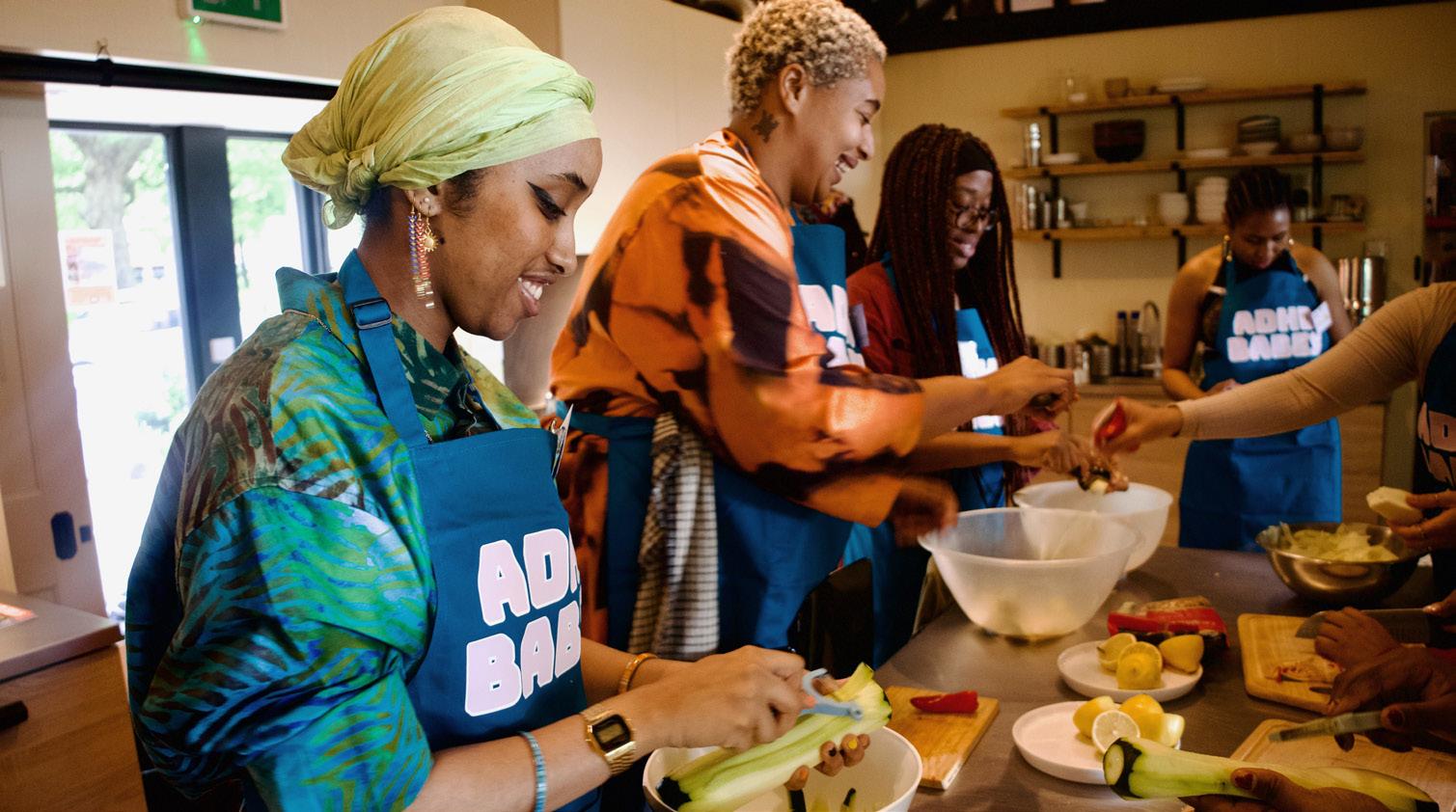
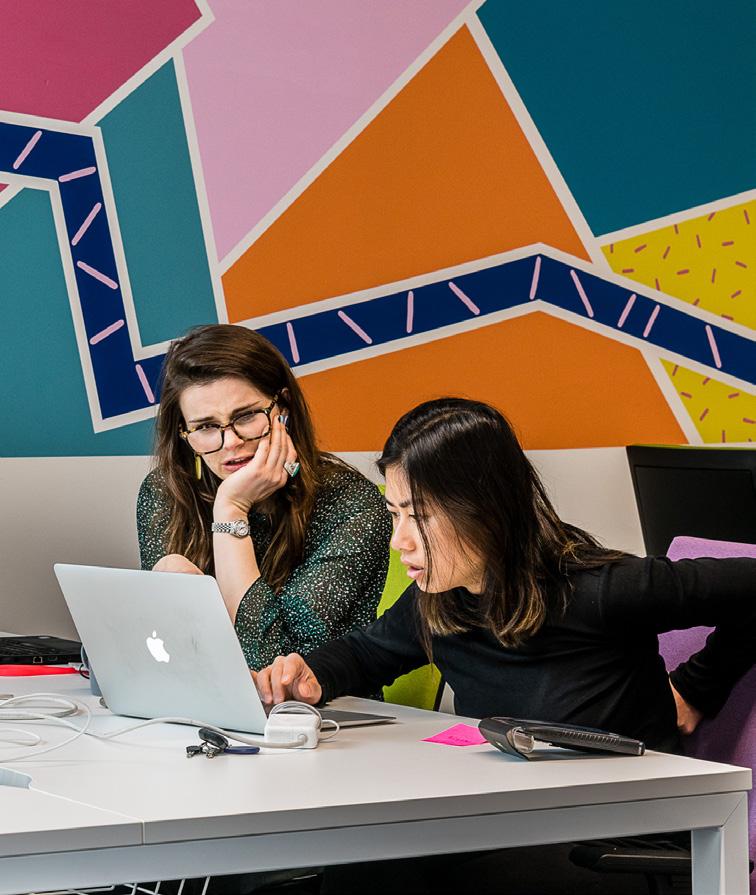
disability justice, neurodiversity and the social model of disability. We offer culturallyspecific care to our community through workshops, support, advocacy, socials and working opportunities.
It’s incredible to see the change we can make in people’s lives through simply giving them a chance and seeing the best in them. People have said ADHD Babes saved their life – that’s the greatest achievement I could possibly think of.
Being in a shared workspace like Space4 really helps us in our work. The biggest benefit is the encouragement and validation you get from being in a room full of other entrepreneurs and trailblazers. This road can be hard and lonely, so it can feel like the soft support you sometimes didn’t even know you needed.
I have met other folks with aligned values and goals, or folks who are used to working with charitable organisations, so we have crossovers in interests and skills. The birds of a feather really flock together in these spaces and it is a beautiful thing.
Also, Islington is my home – that’s ends! I am a north Londoner, born and raised, and
wouldn’t have it any other way. It feels like a blessing and privilege to run a business that gives back to my community on home soil. Plus, I can walk in on less rainy days. Can’t beat that!
of
Virtual Routes tackles the impact of digital and emerging technologies on global affairs through research, education and engagement. Since 2020, we’ve built a growing community of researchers, practitioners, and policymakers who work together to understand and address some of the greatest challenges facing today’s world. My role is to shape our strategy, build partnerships, and ensure that our programmes deliver genuine social impact.
The most rewarding moment is seeing our work have realworld results. Knowing that our work isn’t just theoretical, but is shaping cybersecurity training, policy, and inclusion for communities and future leaders, makes every step worthwhile.
Working out of Better Space, alongside other social enterprises and purpose-driven organisations, has been really beneficial. There’s a supportive and productive culture, where we learn from each other. The flexibility is invaluable, too, as it allows us to balance office time with travel and home working.
Like all social enterprises, resources are limited: affordable access to a central, professional space makes us more visible, credible, and connected.

Alan Torres has lived in Islington all his life. He tells us how, as a care-experienced young person, he’s built a thriving photography business while using his creative work to spotlight stories of resilience and empowerment
I left school at 16 and tried a few college courses, but nothing clicked for me. I ended up working in a restaurant for a while, but knew that wasn’t my future. Things changed when I bought a camera and began travelling around Europe. I loved exploring new places and capturing moments with my camera.
Later, I got a placement at a charity as a creative assistant, mainly taking photos. I had a great team and that experience helped me develop the skills to work independently. I took a six-month photography course and started taking on whatever jobs came my way to build experience, and in my spare time, I was teaching myself how to run a business. Eventually, I set up on my own and haven’t looked back.
Now, I get work mostly through word of mouth and the connections I make. I mainly take pictures at corporate events. I’ve shot for Netflix, the Barbican, and even Liam Gallagher live. I’m also working on a personal project called Resilient Souls, which will showcase portraits and stories of care-experienced people.
To register your interest in becoming an operator or workspace user, email affordable.workspace@ islington.gov.uk
I experienced the care system growing up, and a charity called House Projects helped me get my first flat – and they believed in me. Now I want to pass that belief on. I’ve started mentoring and training other care-experienced young people and hope to do more of that in future.I don’t want to look back with regrets, so I’m saying yes to new experiences and seeing where my lens takes me!
For more on the Resilient Souls project, visit: resilientsouls.co.uk To get in touch with Alan, email him on alan@alantorres.co.uk
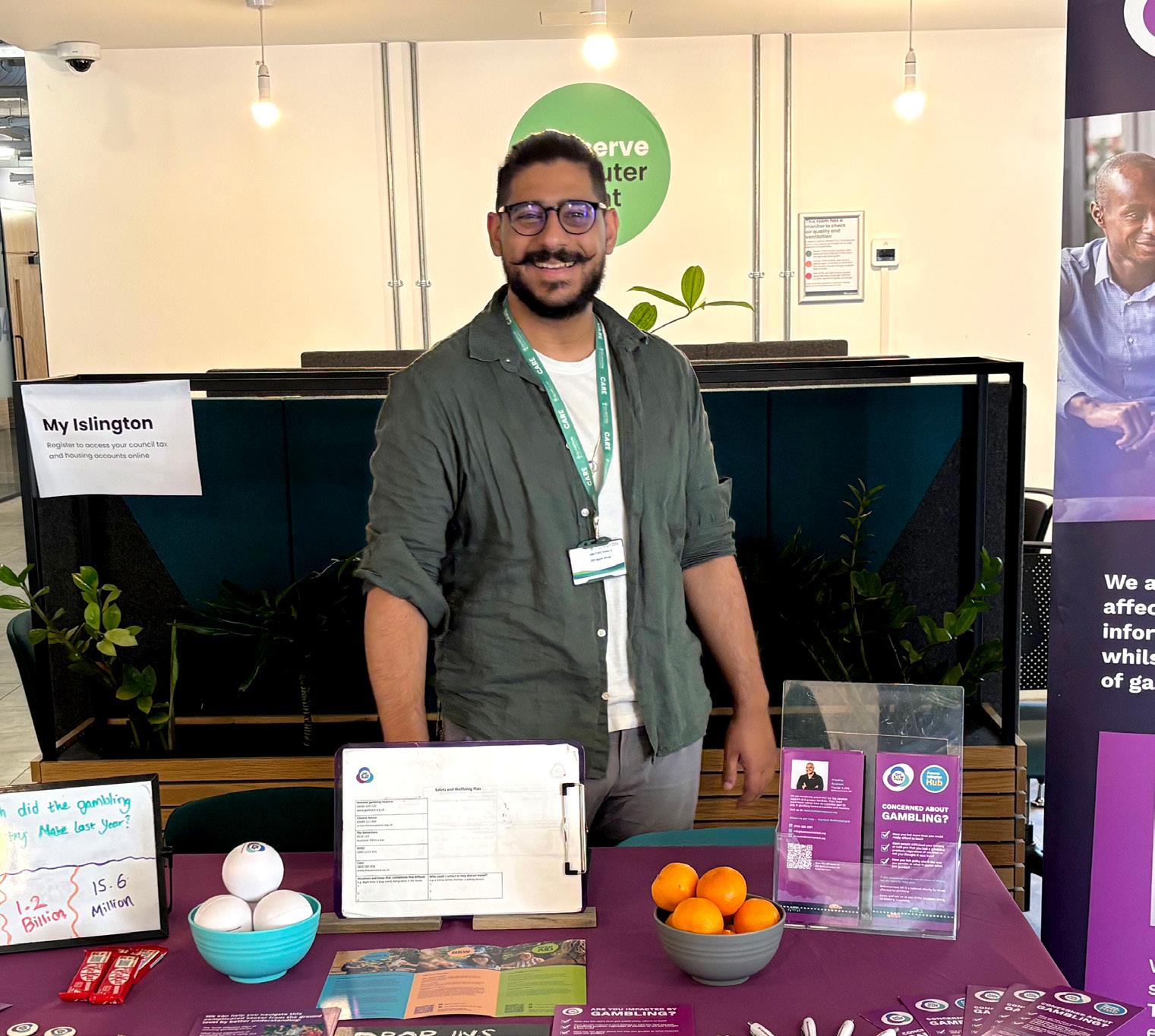
The gambling industry made £123 billion in the UK last year, but gambling can have harmful effects on a person’s life and on those around them. We spoke to Chris, Steven and Ryan from Betknowmore, a charity that empowers people harmed by gambling to live life on their terms, to learn more about the darker side of gambling and the support available to those suffering from addiction
What harm can come from gambling?
Chris: Gambling can cause severe harm to a person’s life, including causing relationship breakdowns, losing your home, debt, turning to crime to finance gambling and mental health issues. For every person who
gambles at high-risk levels, an average of six other people in their lives are negatively affected.
How does Betknowmore help people to face the stigma of problem gambling?
Chris: Feeling ashamed, alone and scared of judgment often prevents people from seeking help with their gambling. At Betknowmore most of our outreach staff have had some experience with problem gambling, whether they have been a gambler themselves or been affected by it through friends and family. This means we can relate to people who use our service, understand them and be living proof that there is hope for the future.
Do you provide tailored support for particular groups?
Chris: We provide structured group support in a safe space for women who are impacted by their own gambling or by the gambling behaviours of someone close to them. Facilitators with lived experience are there to listen, give practical advice and help women make lasting connections with each other.
Ryan: We also have something called Break the Cycle, which is a project focusing on empowering Black communities to begin to tackle the disproportionate gambling harms affecting Black people in London. While people from Black communities are less likely to gamble, those who do gamble are more likely to experience gambling harms than their white counterparts. Racism and discrimination have been shown to increase gambling behaviour through social exclusion, reduced employment opportunities and mental health issues.
Chris: Last year we worked with the Faiths Forum for London to develop a presentation raising awareness of gambling harms within the Muslim community. We encouraged people not to feel any shame or judgement and instead to speak up about their experiences. The stigma of gambling can be harmful as it can cause someone to shut down, isolate themselves, hide their issues and suffer in silence
Steven, you previously used Betknowmore to help with your gambling issues. How would you sum up your recovery journey?
Steven: I entered recovery in 2015. I was helped by Frankie Graham, the founder and CEO of Betknowmore. I was mentored and counselled, which helped me
address childhood experiences and the distorted way I viewed gambling, money and the world in general. I was supported with my personal development, too, which helped me to rebuild bridges I thought had been burnt. This helped me get back into football again, so I could work with football clubs, advising and coaching. I became confident enough to put gambling behind me – to the point where I started volunteering for the service to help others who had been in similar situations. I now work as a safer gambling advisor for Betknowmore.
What would you say to someone who might be struggling with gambling?
Steven: Don’t be afraid to ask for help. People experiencing addiction don’t have a good view of themselves, so it’s important to be honest with yourself and be mindful of your actions and how gambling is impacting you and others around you. Not being satisfied can cause you to continue to gamble, because you continue chasing something you can’t hold onto. Betknowmore takes a holistic approach to help people stop gambling, meaning they support your overall health and wellbeing and help people find a healthy alternative to gambling. They can help you manage triggers and get back control of your life.
If you’re concerned about your gambling habits or those of others, drop by to see Betknowmore for a confidential chat 10.30am–3.30pm at Manor Gardens Centre on Wednesdays or 222 Upper Street on Thursdays. Or, call on 080 0066 4827 Monday to Friday 10am–5pm or ring the National Gambling Helpline on 080 8802 0133, 8am to midnight, seven days a week.
Betknowmore helps people all over the UK. Simply complete an online assessment on the website to see if you could benefit from their help: betknowmoreuk.org:
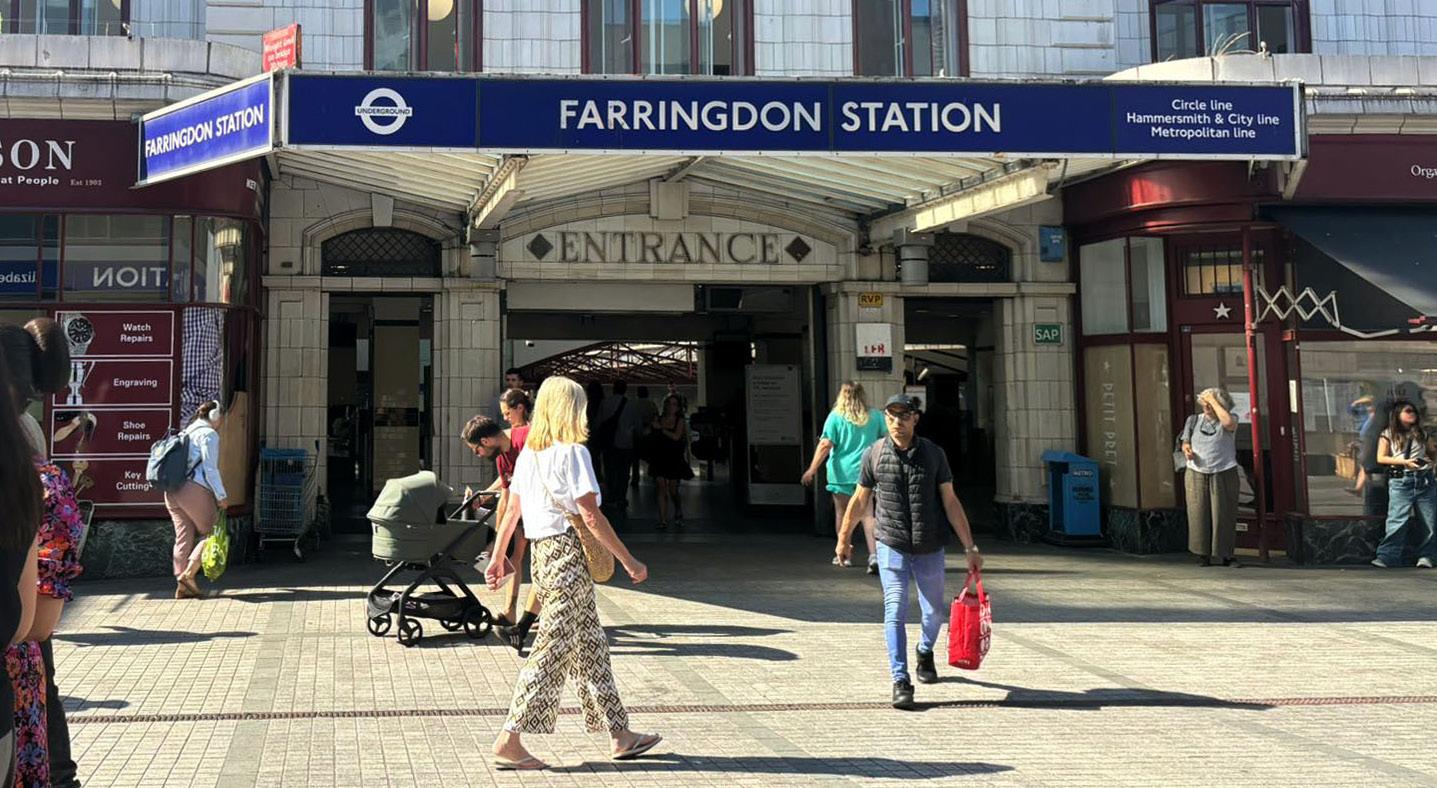
Islington Council has received reports of people being pressured into giving money to organisations outside Farringdon, Old Street, Highbury and Islington and Finsbury Park stations. This is also known as ‘chugging’ or ‘charity mugging’. The council has shared concerns with government; requesting enforcement power so we can help protect you from these persistent street collectors.
Many of the people asking for donations do not have a street collection license and are not working for a registered charity, regulated by The Charity Commission. This means they don’t follow the law that collectors must not be a danger, obstruction, inconvenience or annoyance to anyone.
Here’s how to spot – and politely deal with them – if you’re approached when out and about
Collectors grab your attention with flattery, distraction and dishonesty. They’ll say things like: “You look friendly”,” You’re looking beautiful today”, or ”You’ve just dropped something”.
If approached in the street, the best thing to do is ignore them. Carry on walking and going about your day.
If you do speak to them, you can say: “I’m not interested”, “I don’t want to speak to you”. Or, ask what the name of their organisation is and say you’ll research it later.
If you are considering donating, wait until you are home before making a decision. This gives you time to think about where your money is going.
If you experience harassment, report it to the police. Harassment is illegal. Examples of harassment include blocking someone’s path, persistent questioning, unwanted physical contact, following and catcalling. Call 101 or report it online: met.police.uk
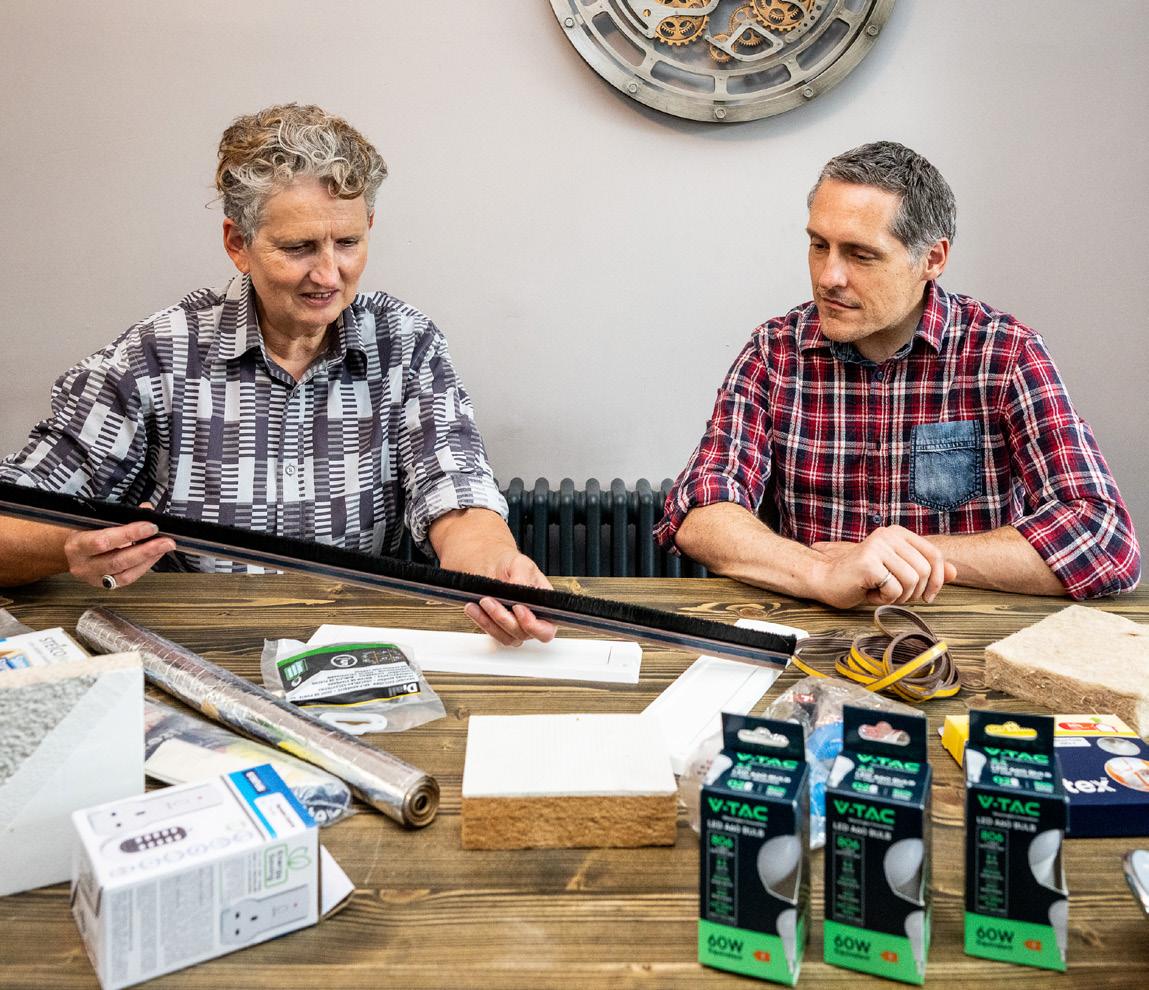
Local homeowner and DIY-er Edward and retrofit coordinator Alice share their tips to save money on your energy bill, while making your home warmer and greener
Whether you rent from a private landlord, live in social housing or you’re a homeowner, there are simple, affordable changes you can make that will help you save money on your energy bills, and make your home more comfortable.
Even small changes like using LED lightbulbs and putting reflective foil on the back of your radiators can make a big difference. These low-cost upgrades help keep the heat in during winter and save you money. For example, draught-proofing around windows, floors and doors could save you around £85 a year.
For those ready to invest more, options like insulation, efficient heating systems, or solar panels offer long-term savings and a warmer, healthier living space. “We started by replacing the roof,” says Edward, an Islington homeowner renovating his
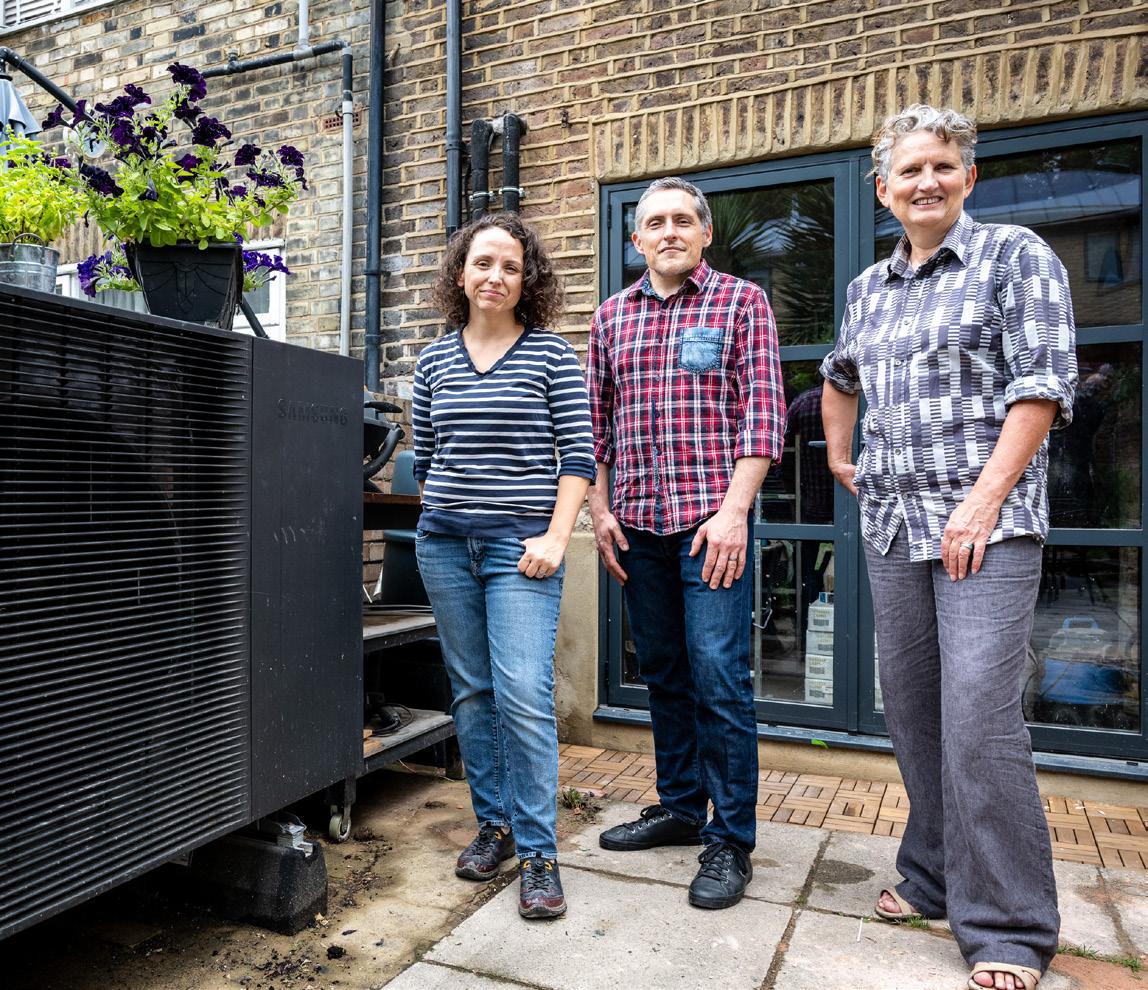
Victorian property. “When that was done, we fully insulated it. We replaced all the windows with double-glazing and, as we rebuilt the rooms, we insulated all the floors between levels.”
But his biggest tip, if you can afford it, is to invest in solar panels. “We put solar panels on the roof – that was probably the most straightforward and easiest to justify,” Edward continues. “I recommend that everyone in the country who has a roof gets solar panels. Electricity is so expensive – it’s a no-brainer.
“Most recently, we installed heat pump heating and got rid of gas. Now it’s an all-electric, all-green house,” he says. “The comfort is the biggest benefit –the temperature inside is now flat all year round. With gas boilers, it changed a lot. Now the temperature is perfect all the time, much more comfortable.”
Making changes like this to your home, known as ‘retrofitting’, is also good for the planet. Homes account for a large share of carbon emissions (the amount of carbon dioxide released into the
atmosphere) and making them more energy-efficient is one of the most effective ways we can all contribute to tackling climate change.
“I think we all need to prepare for adapting to climate change,” adds Alice, who runs AAB Architects in Archway and is a qualified retrofit coordinator. “Retrofitting our homes helps us prepare for what’s coming” – more expensive energy and an unpredictable climate, with hotter summers and possibly colder winters.
“By thinking about how our homes work from an energy perspective and making them more thermally efficient, we’re preparing for that,” she continues. “It’s about climate resilience as well as stopping carbon emissions from going into the atmosphere.”
For more energy-saving guidance, including no-cost tips, plus information on retrofitting, visit the council website: islington.gov.uk/ EnergySavingGuidance
In each issue, we delve into the many ways Islington parks and greenspaces are benefitting local people. This time, we speak to Sarah Wood from the Friends of St John’s Gardens
Tell us about St John’s Gardens.
It’s a small space, but much loved. Lots of local people don’t have gardens, so it’s important to have a nice green space for them to enjoy. We have a pond, which is great for biodiversity, and huge, ancient trees. It’s lovely in the summer to sit in the dappled shade. We also have an edible forest, a compost area, where we re-use all the fallen leaves and woodchip, and lots of different habitats for wildlife.
It’s hard to believe for a space just by Farringdon station, but the air actually smells fresher under the tree canopy. It’s a great space to sit and watch the butterflies, birds and bees – to just breathe and get all the benefits of being in nature. Sometimes we have sessions like yoga or chi gong under the trees, which is really special.
How did you get involved?
I moved to the area and started volunteering here around
five years ago. When you live somewhere that is so urban, green space is incredibly precious. It’s a vital resource for the community, as well as for wildlife and plants. It’s been a pleasure to look after the garden and meet neighbours.
Islington has a whopping 19 Green Flag Awards, including for St John’s Gardens! What does it mean to you?
It was a wonderful experience. The whole community pulled together in the run up to the Green Flag Award: it gave us a sense of purpose. I’d recommend any other green spaces to consider taking part! It was such a huge achievement, and gave us such a sense of pride. It’s testament to this community.
The judges are looking for an inclusive and accessible space that encourages nature. All the volunteers worked hard, and closely with the council, to get this recognition. You can’t tackle all the problems of the world, but you can come together as a community to care for a space and do your bit.
Interested in volunteering in a local park? Visit the council website to find a Friends of group near you: islington.gov. uk/parks
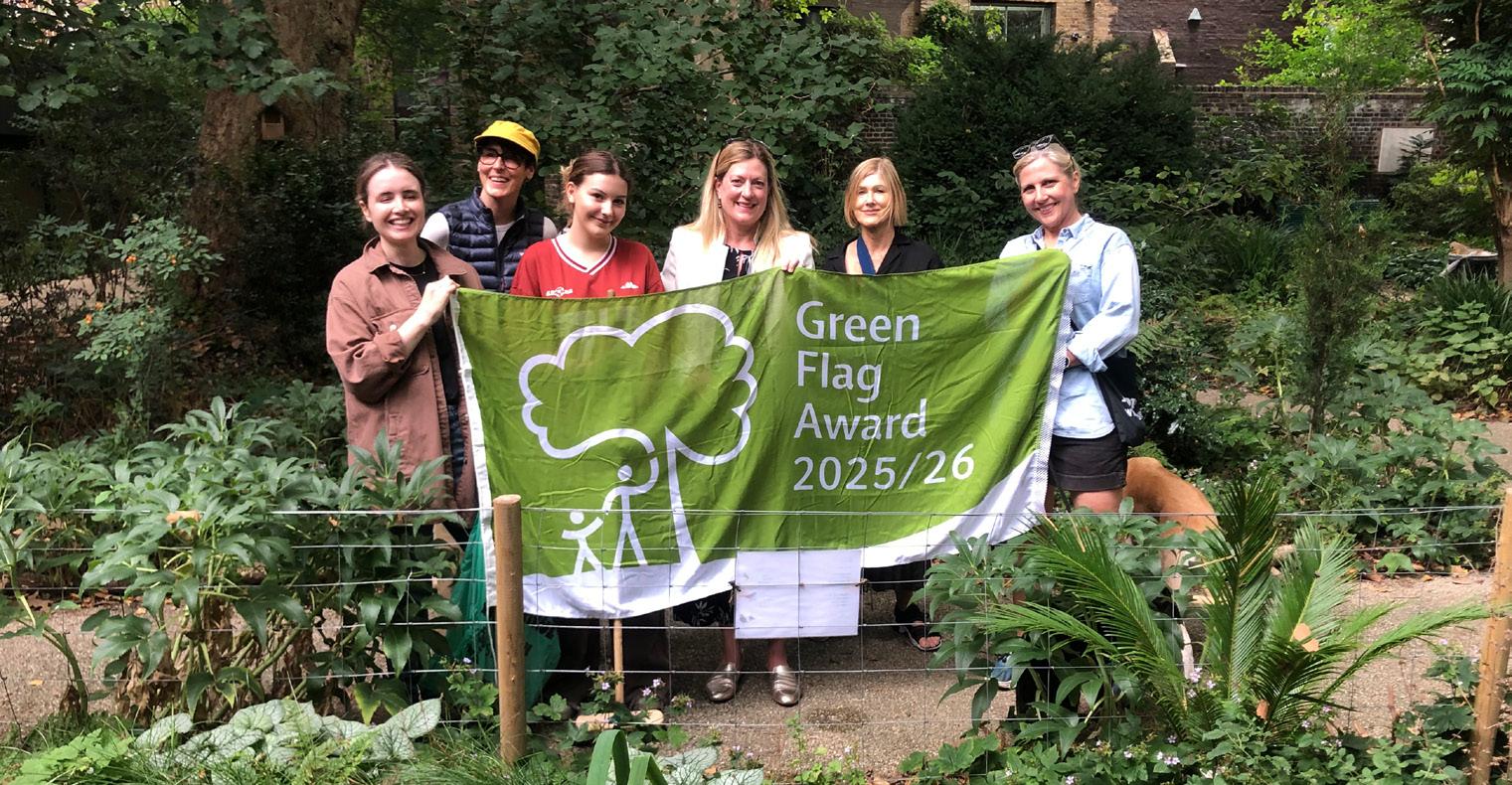
1) Use the free outdoor gyms
Check out the changing seasons as you exercise in the fresh air. Eleven of our parks have outdoor gyms, including Barnard, Tufnell Park playing fields and Arundel Square. Find one by searching on the Find Your Islington Directory.
2) Relax into movement in nature with qi gong
Healthy Generations run free classes (with a suggested £3 donation) outdoors in Dartmouth Park and King’s Square, in Whittington Park Community Centre, and seated sessions in the Sundial Centre. No experience necessary!
3) Have a kick about
Men’s, women’s and children’s football sessions are available across Islington, from beginners to those looking to join a midweek league – as well as walking football for those who prefer a slower paced version of the beautiful game. There are also five parks with football pitches for hire, as well as those on offer at Better leisure centres, if you prefer to organise your own meet-up.
For more info or inspiration, check out Islington Council’s Find Your Islington directory for a wide range of activities for all abilities, many of which are free! Visit: findyour.islington.gov.uk
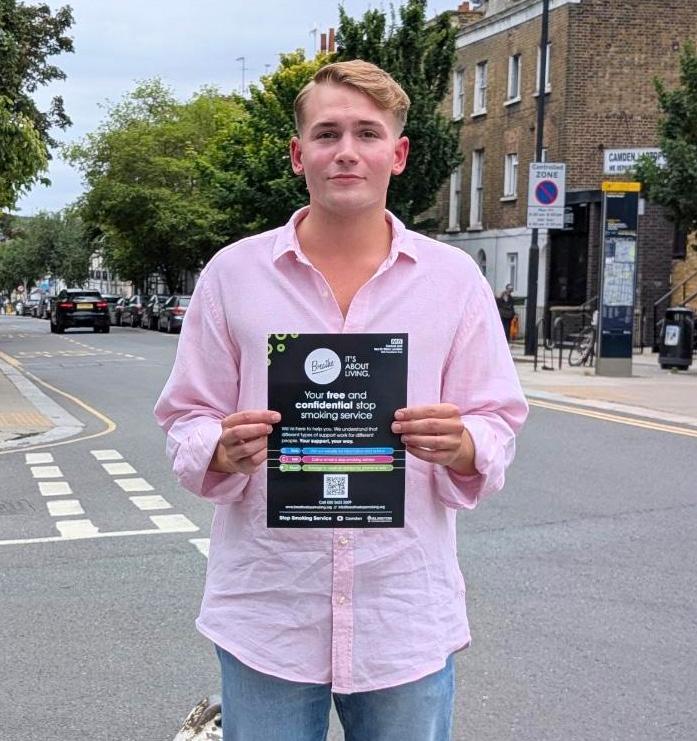
Marek, a student who used the Breathe stop smoking service, on how it helped him beat his addiction after 10 years as a smoker
Tell us a bit about yourself.
I’ve been living in London for seven years and I’m originally from Estonia. I’m studying at the Open University. I joined Breathe in December 2024 and on Friday, I’ll be six months smoke-free.
When and why did you start smoking?
I started when I was about 14. I never made a conscious
decision to start smoking – my friends just all smoked, so I tried it. I liked the taste and it stuck. I was under a lot of stress from school and home, and smoking became a release.
How did smoking affect your health and social life?
I’m very active, but I couldn’t run or even walk up a hill without getting out of breath. I had high blood pressure, constant headaches, and ‘black death’ on my gums, or dental calculus. It also worsened my acne, which really affected my self-image. I’d wake up feeling like a heavy cloud was over me. It impacted
my mood, my health, and my self-image.
What made you finally decide to quit?
I’d been thinking about quitting for years. The headaches were awful and I wanted to get back to working out and sleeping better. This time, I decided to ask for help – for the first time with something like this.
What challenges did you face when quitting?
Everything reminded me of smoking! Coffee, socialising, drinking, it was all linked. I stopped having coffee because it triggered cravings. I avoided friends who smoked and drinking, because I knew I’d have a cigarette. The first few weeks were tough – no sleep, mood swings – but it was so worth it!
How did you successfully quit?
I had to change how I saw myself. I also was prescribed varenicline, a medication that made cigarettes taste awful. That helped me stay away long enough for my brain to rewire itself. It completely removed the pleasure from smoking. Even if I had a cigarette, it tasted horrible and didn’t give me the nicotine hit. That made it easier to say no. I avoided temptations and focused on becoming the person I wanted to be.
How has your life improved since quitting?
Massively! I can work out again, my skin is better, my mood is more stable, and my head feels clearer. No more gum problems. I just feel a lot lighter.
I have had to distance myself from people I used to smoke with, so I’ve been spending more time alone, but I know the right people
will come. It was a necessary sacrifice for my health – and it was worth it.
What advice would you give to others trying to quit?
Keep trying. Don’t give up. It took me years. And ask for help –Breathe offers so many options, so you can try different things to see what works. I used to try to do it alone, but having support makes a huge difference. And don’t let shame stop you. We all fall. The shame – both internal and from others – can make it harder, but you deserve to try again, and again, and again if you need to.
What difference did Breathe make in your quitting journey?
My Breathe advisor, Surbhi, kept me accountable. She held up a mirror for me and reminded me I had a duty to myself. She was also the only person who supported me through this journey. She told me she was proud and encouraged me to keep going. That meant everything, especially when you don’t have it from friends or family.
Breathe showed me all the options that are available and reassured me that it’s okay if something doesn’t work, there is always something else you can try. That flexibility and support helped me believe in myself. I also met others on the same journey, which made me feel less alone. It’s a personalised, supportive service, and that’s what makes it so powerful.
Want support to stop smoking for good? Visit the Breathe website for more information and to prepare a plan that helps you kick the habit. Visit: breathestopsmoking.org Or call on 020 3633 2609

1) Eat heart-healthy meals
Add less salt and sugar and cut down on saturated fats like ghee or coconut oil. Swap them for vegetable spreads or sunflower oil
2) Get active – every movement counts!
Adults need about 150 minutes of physical activity a week –gardening, brisk walking, and housework all count!
3) Quit smoking
Quitting smoking lowers your risk of serious illnesses like stroke or heart disease. Don’t be discouraged by setbacks and get professional support from Breathe.
4) Say no to binge-drinking
All alcoholic drinks are unhealthy. If you do drink, cut back with a half rather than full pint of beer or a smaller glass of wine. Try not to drink more than six pints or six medium glasses of wine per week (and not all at once!)
5) Know your numbers
Your blood pressure is important to your heart health. Get your blood pressure checked at community pharmacies or a full check-up from your GP as part of an NHS health check.
Feeling heart smart? Why not try the NHS heart age calculator to check how healthy your heart is: nhs.uk/health-assessmenttools/calculate-your-heart-age
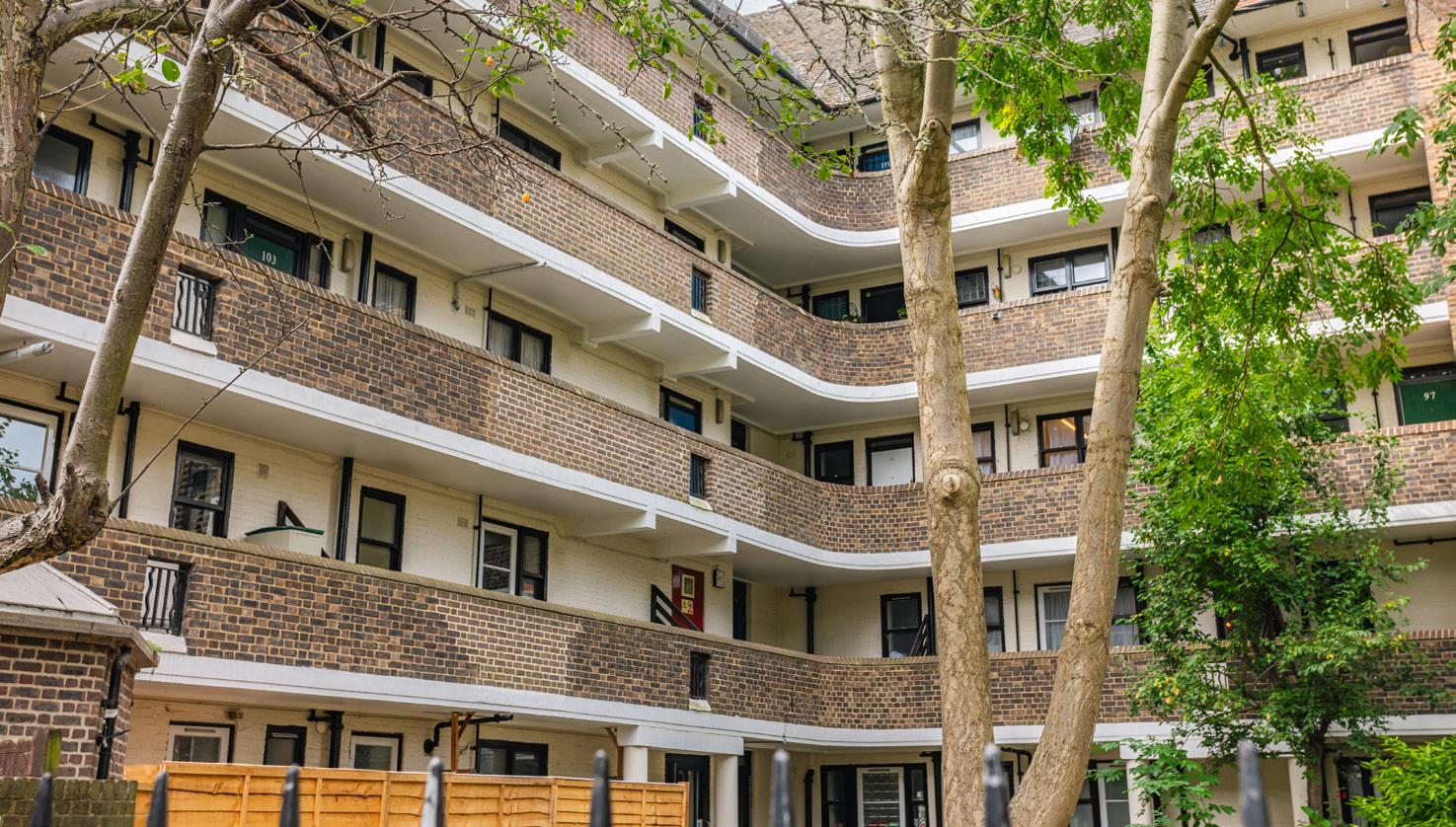
How the council is checking homes to plan improvements –and how you can help
Over the next five years, the council is carrying out surveys across its housing stock to make sure homes are safe, energyefficient, and well-maintained. This will help the council understand what repairs or upgrades are needed and plan future improvements.
The checks are being carried out by Ridge, a trusted partner of the council. Ridge surveyors are visiting homes across the borough to assess their condition and collect important information. This includes looking at kitchens, bathrooms, windows, boilers, and even roof spaces and gardens.
The surveys also help the council understand how energy-efficient homes are. In some cases, Ridge will collect extra data to create an Energy Performance Certificate, which rates homes from A (most efficient) to G (least efficient). This helps the council plan upgrades that could lower energy bills and reduce carbon emissions.
If you live in a council home, here’s how you can help:
Look out for your letter: the council will be in touch to let you know when the survey will take place. The visit will usually happen within six weeks of that letter, on a weekday between 8am and 6pm. You’ll need to be home to let the surveyor in.
Check ID: the surveyor will carry a Ridge photo ID and a letter from the council. Always ask if you can see their ID before letting them in.
Keep pets safe: please keep pets in another room during the visit.
Reschedule if needed: Don’t worry if you miss the visit, Ridge will leave a card so you can book a new time.
The survey usually takes less than an hour and helps the council plan improvements that benefit everyone. Find out more about what happens during a survey on the council website: islington.gov.uk/ ConditionSurveys
Each issue, we shine a light on the new homes being built in the borough. This time, we look back on the progress made over the last year
Over the past year, the council has delivered 80 high-quality homes for local people – lifechanging spaces that help people put down roots and thrive.
On Windsor Street, 11 homes have been built for adults with learning disabilities, helping them stay close to their support networks and live independently in the community they know and love.
On the Andover Estate, 16 new two- and three-bed homes have been completed on Franchise Place, with another six homes on Corker Walk, through the innovative transformation of unused garages. An additional 20 homes are due to be completed by the end of the year, as part of the council’s ambitious plan to build hundreds of genuinely affordable homes across Islington.
A further 27 homes were completed at Dixon Clark Court and 20 at Parkview Estate, with 11 more coming soon. On Elthorne Estate, 25 homes are set to be delivered by the end of 2025.
These are more than just places to live – they’re the foundation for a fairer, more equal Islington.
For more on housing developments, visit: islington. gov.uk/HousingDevelopment
Each issue, we spotlight the people and programmes making Islington a more welcoming borough. This time: a community gardener who is transforming the Andover Estate
Since January 2024, Katarzyna, or Kasia, has been Andover Estate’s housing community gardener. She’s a familiar face among residents and has had a transformative impact.
Her grandmother’s community in Poland centred on gardening and a shared appreciation for nature – Kasia’s inspiration. The council funds her role as part of its commitment to providing meaningful community investment.
Before joining the council, Kasia
volunteered in many gardens and led a greening project on her own estate. This informed her approach to Andover. She began by providing weekly workshops in Andover Community Centre, upgrading their outside space into a lush garden. She then branched out, recruiting residents to help. “An estate is a very particular, special thing – you have to carry people with you,” she says. “This is ultimately about people, not plants – the gardens are just a lovely outcome.”
Kasia’s people-centred strategy is working. Two residents of Todd’s Walk describe improvements to their whole lives through gardening with Kasia, sprucing up the walkway with flowers bursting with
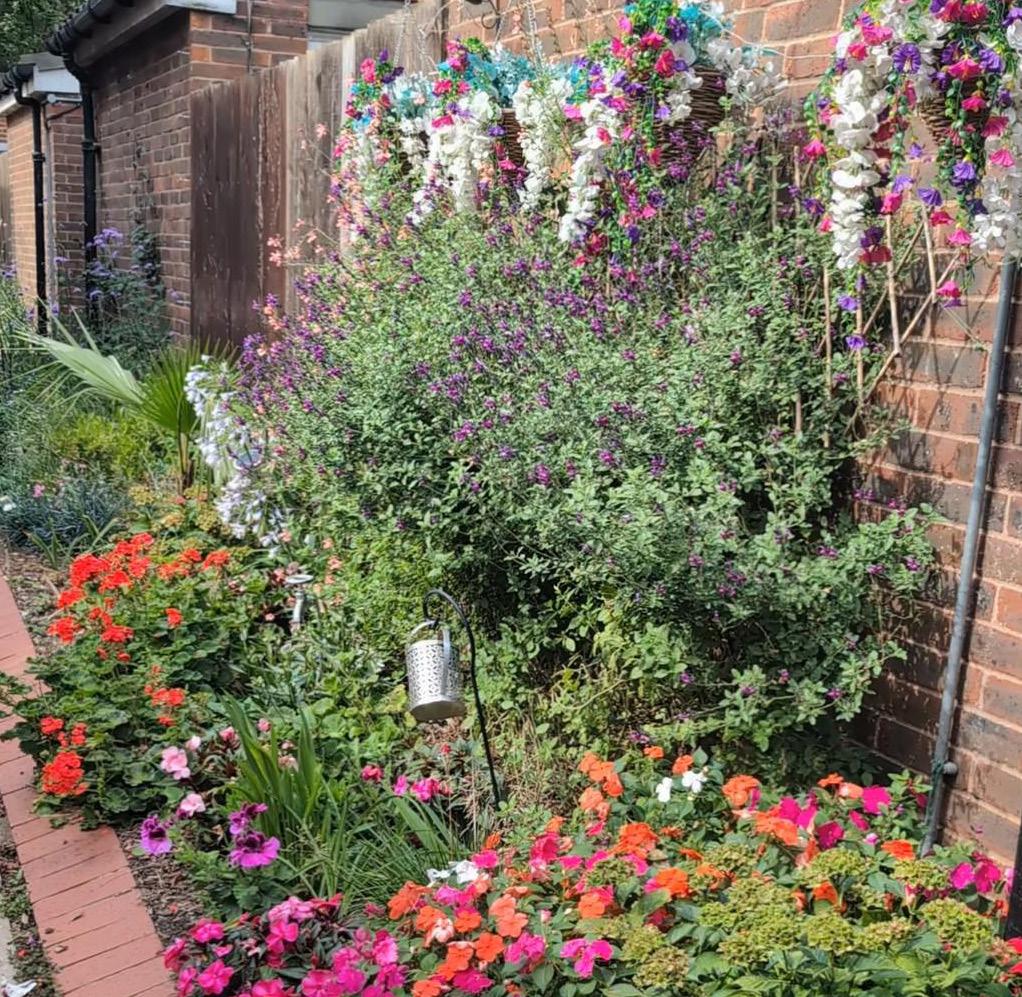
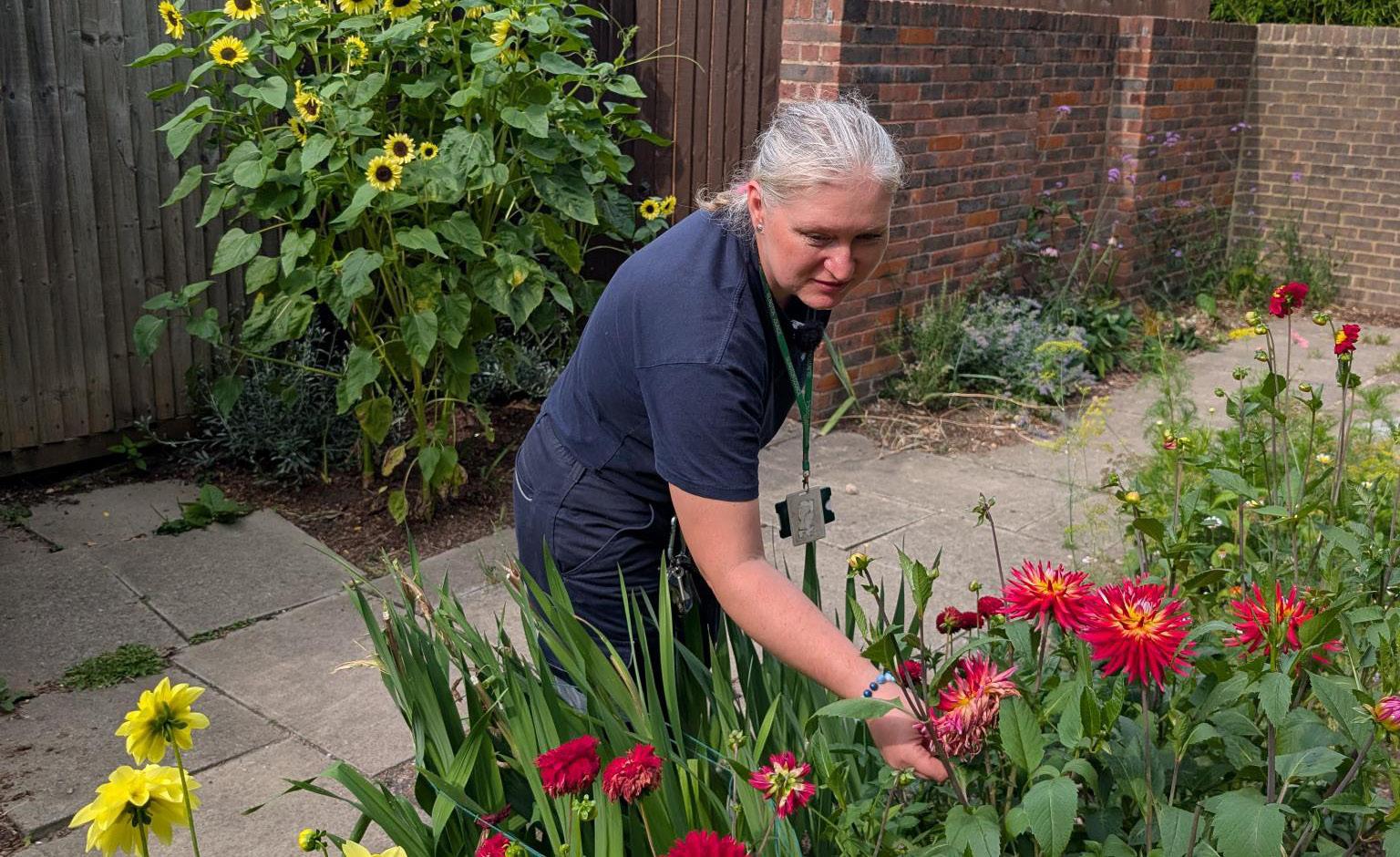
colour. “It was a jungle out here,” says Gillian. “Now people come out to talk, to garden, and we’re even throwing our first event in the new communal area” – a surprise fiftieth birthday party for a neighbour.
Ify hadn’t gardened before receiving Kasia’s guidance, and now she loves it, seeing the benefit every day. “It’s a collaboration,” she says. “It’s brought the community together.”
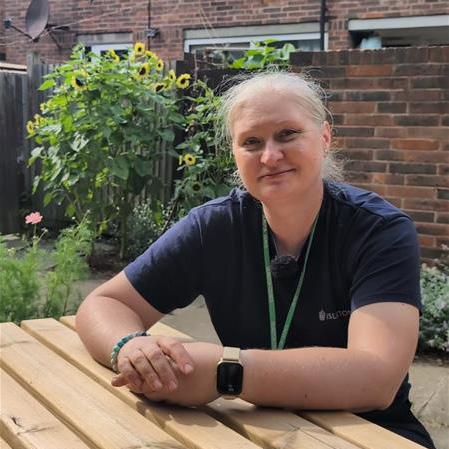
Kasia’s planting choices reflect the community’s desire for colour and sustainability. Ornamental plants bloom alongside edibles like blueberries and herbs, and a bench has been added to encourage connection. “It gives people space to talk.”
The team earned ‘highly commended’ at the council’s staff CARE awards. But for Kasia, the real reward is seeing residents grow alongside their gardens. “Facilitating people and transforming lives through gardening, this is what I was always looking for,” says Kasia. “No matter your background, everyone deserves to be surrounded by beauty.” Find
We meet the four adventurous young people who won Islington Council’s competition to become Chief Discovery Officers this summer. They’ve been exploring the borough, video camera in hand, to capture and celebrate some of the amazing things children and families can see and do for low or no-cost, and sharing their adventures on social media. They tell us why they applied, what they’ve enjoyed most and their hopes for the future
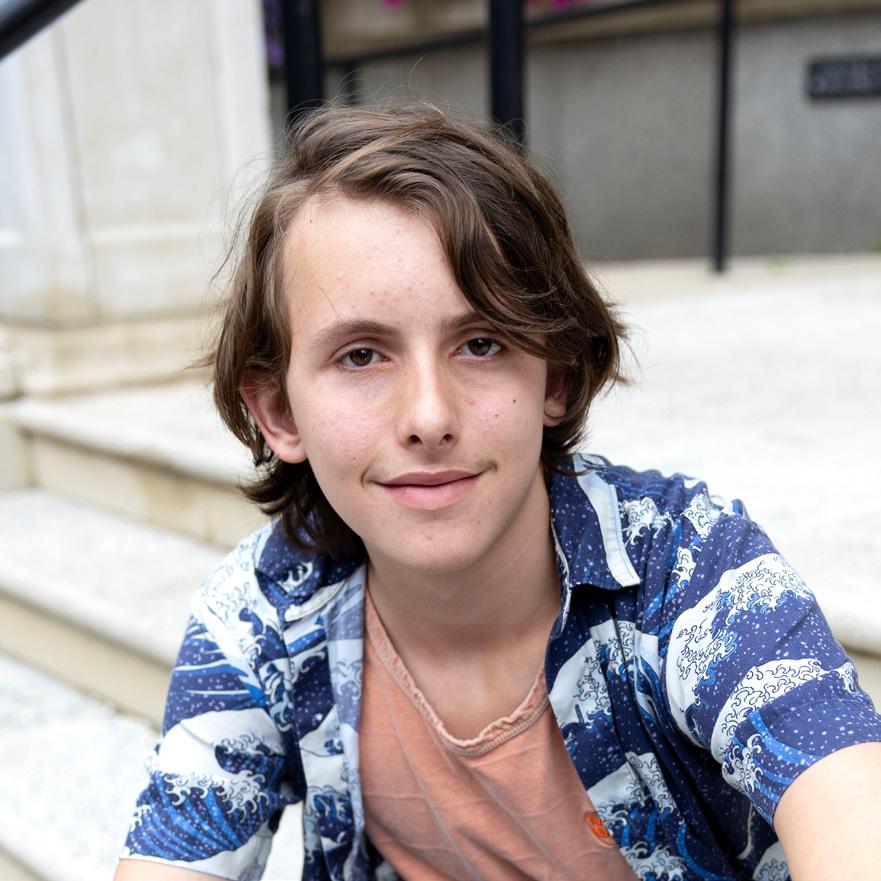
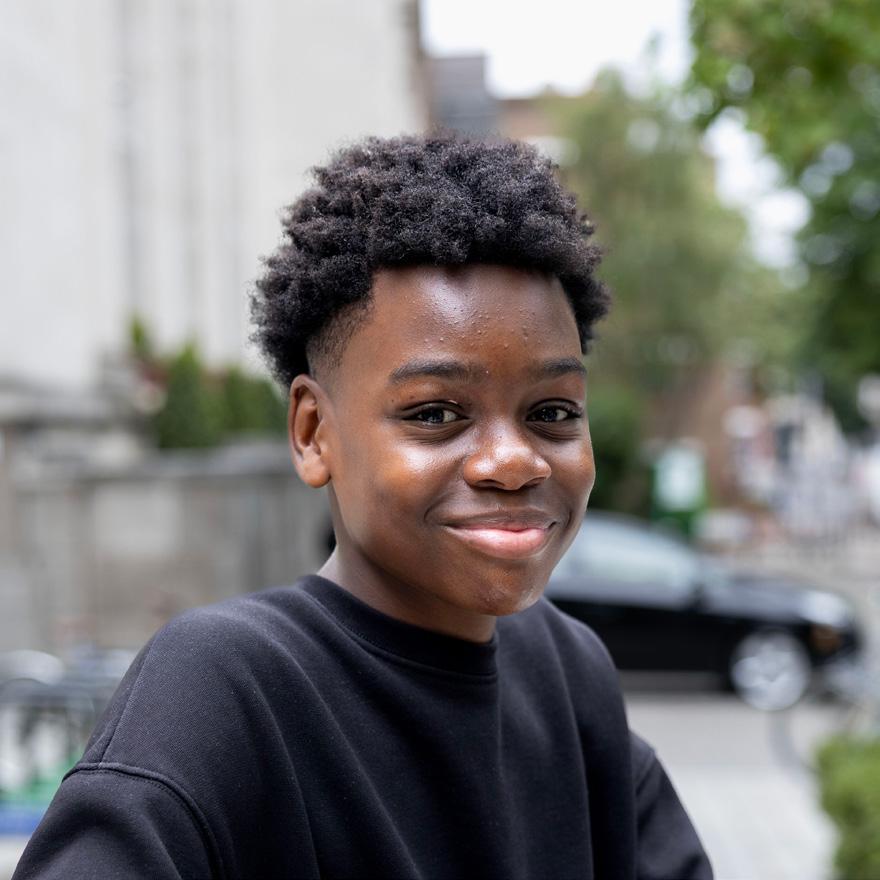
Tam, 14
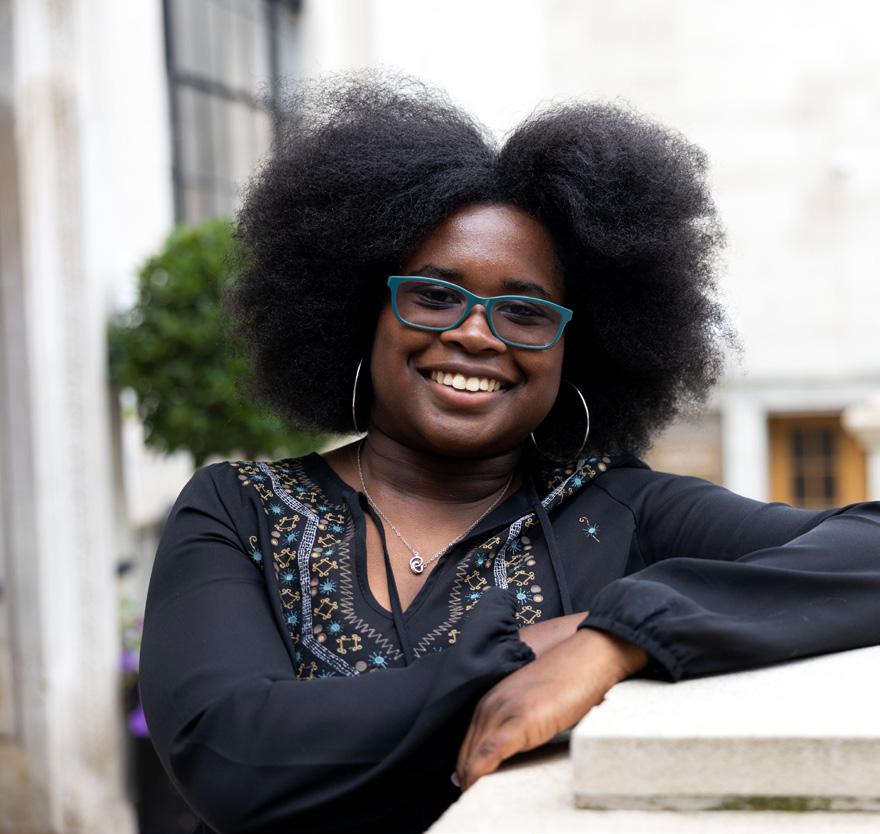
I applied for the competition because I really want to get into the media and videography industry. I love making films and thought that being a Chief Discovery Officer would be a really good opportunity to put my creativity out there.
There’s so many good things about Islington, like the diverse shops, so many green spaces, free or cheap opportunities for young people – for example, I’ve done courses at the Young Actors Theatre, as well as Summerversity activities at Lift and London Screen Academy.
Being a Chief Discovery Officer has been fun. I really like having deadlines because I have a lot of ideas! This has really pushed me to get it out there and to focus. I hope to get more opportunities out of it – to build a group of people who are interested in the stuff I create that will lead me to making more in the future.
I entered because it’s a fun opportunity, and also my mum suggested it. She said it will probably be fun. I also wanted to gain life skills like putting myself out there, exploring things, seeing things differently. I think it has been a valuable experience.
I love that Islington has so many different things you can do, for all ages, especially in the summer. It’s just a fun place to explore. There’s always something going on. One of my favourite things is the Cally Festival.
I’ve definitely enjoyed the experience, especially filming at Chapel Market. It was like a walk down memory lane. I also did a video about Whittington Park. I loved going there as I go to parks sometimes but not as much as I’d like, so I was just glad I got to film in a park setting.
I decided to enter the Chief Discovery Officer competition because I wanted to do something productive over the holidays, and I thought that if I could help other people my age also do something productive, that would be a good thing.
I like Arsenal’s stadium, the Finsbury Park running track, and shopping at the Angel – they’ve got Flying Tiger Copenhagen, and a stall selling great churros during the summer. They’ve got all the shops you could want, it’s good mix.
I haven’t done any filmmaking before, but I really enjoyed it. It hasn’t been easy being a Chief Discovery Officer. Like the recording, for example: I do find it fun, but it can be challenging sometimes, making sure I get the right angles, the right footage that I need. It has definitely been good doing the storyboarding and planning out what you’re going to do.
I‘m very proud of myself for completing it and actually finishing – I have that sense of pride.
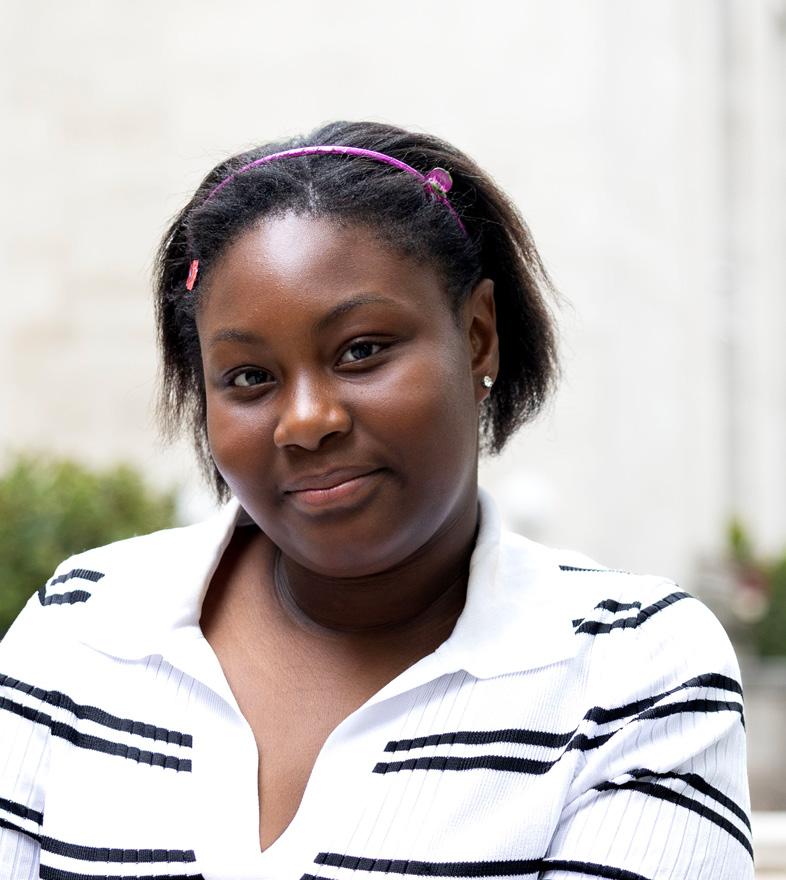
Teayanna, 11
I applied to be a Chief Discovery Officer because I love Islington, and it’s just an environment that I’ve been in for a long time and I feel like it’s basically a place where you get to have fun.
I also entered because I just wanted to see what it was really about and help out. Islington is special because I love the nice people in the borough. I also wanted to inspire other children and let them know that there is interesting stuff to do in Islington.
I have to wake up early, plan what I’m going to do for the day, record everything, and put together the video. The experience was good: I have especially liked bonding with lots of different people in Islington.
Check out what the Chief Discovery Officers have been up to this summer over on the Islington Council Instagram: follow @islingtoncouncil and #DiscoverIslington For more opportunities for young people, including joining the Islington Youth Council, info and advice, visit: izzy-info.com
Just as school plays a vital role in every child’s development and future, missing school has a huge impact, too. Specialists Remi, Gretchen and Uma tell us more - and how they can help
Remi: We are all early help attendance mentors at Islington Council, working with schools to identify pupils whose attendance is starting to dip. Tackling the problem early on can make a big difference, and we want to ensure your child is in school, learning, and thriving.
We mostly work with children on a one-to-one basis in school, but we also support parents to ease their anxiety and improve attendance.
Uma: From the first session with each pupil we’ll try to understand what the challenges are. For some people it could be because of bullying, because they don’t like the teacher or the lesson, or they may struggle with simply waking up in the morning, having a routine, or perhaps mental health issues.
It’s about small steps and understanding what works for each individual. We try
to understand what they’re struggling with and will work with the school and parents to address those things in a way that they can personally achieve.
Gretchen: In any other situation at school, 90 percent sounds really positive. But when you break it down, 90 percent is 20 days missed in a year – that’s around a month. It’s really hard to break that habit once it becomes ‘normal’, so it’s important to get in early and shift that mindset.
Going to school every day helps kids achieve academically, but it also helps with soft skills – empathy, sharing, critical thinking, routine-keeping, time management. School is a place that can help prepare a young person for their adult life, for example being on time at work. When you hone those skills at a young age, you’re more capable when you’re older.
If you’re concerned about your child’s attendance, speak to their teacher or the school’s attendance lead. See islingtonlife.london for 10 top tips for improving attendance.
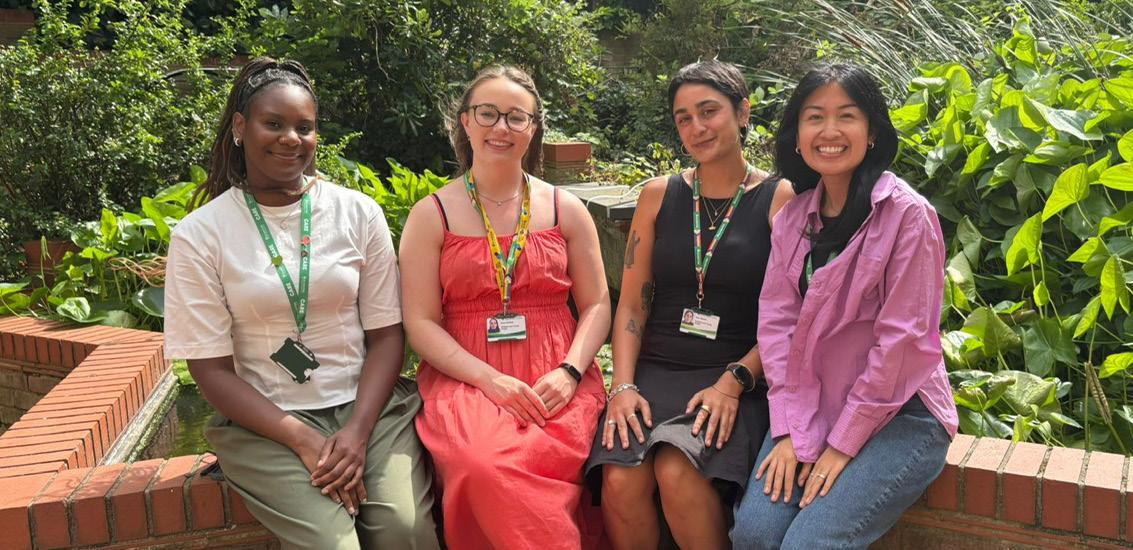
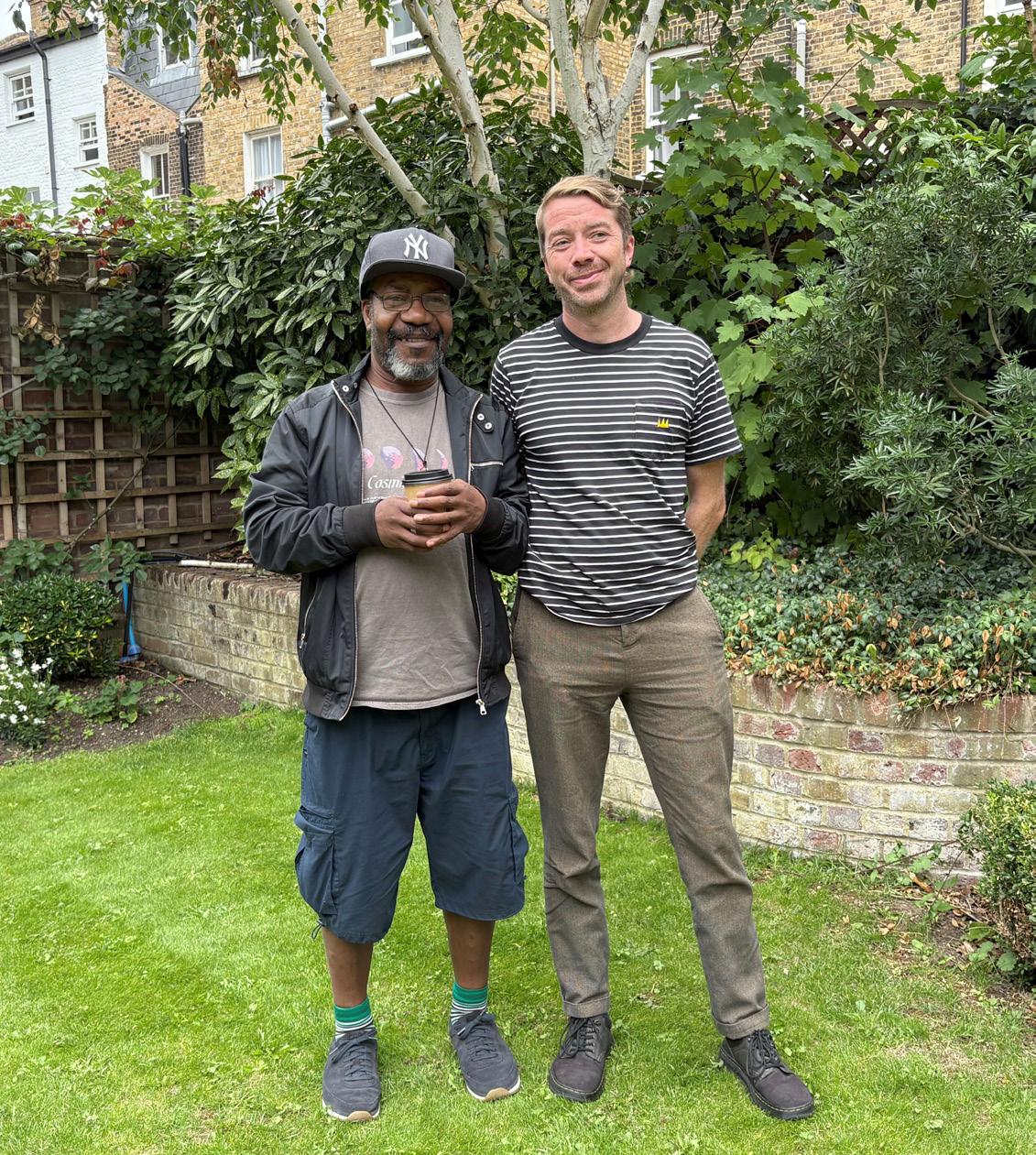
Islington Bereavement Service is celebrating its ten-year anniversary. We sat down with service manager Gareth, volunteer Susan and Joseph, who has used the service, to find out more about how it helps local people navigate grief through community connection
For the past decade, a unique volunteer-led bereavement service hosted by St Joseph’s Hospice has been quietly transforming the way Islington residents navigate grief.
The project set out to bring bereavement support into local neighbourhoods, making it accessible, personal, and rooted in the community. Commissioned by the NHS and Islington Council, the service began with a simple aim: to connect people who were grieving with trained volunteers from their own borough or nearby areas. “We wanted to deliver a community, volunteer-led bereavement service in Islington,” explains Gareth. “It was about recruiting and training volunteers from the community and letting local services know that people could refer in. From day one, anyone living in Islington or registered with an Islington GP could be referred. Many people also self-refer after hearing about us.”
Support begins with a thorough assessment, often in the comfort of the person’s home. “It’s about
creating that initial space to be heard,” says Gareth. “Sometimes people find it harder to speak to their families. Having someone with no stake in what’s being said, who will be completely nonjudgemental, can make all the difference.”
Once matched, participants are offered up to ten free weekly sessions. Meetings might happen at the hospice, in a library, over a walk in Highbury Fields, or in a quiet cafe. “We use core counselling skills, but with more adaptability,” Gareth explains. “Walking and talking can be powerful.”
Volunteers are the heart of the service, coming from all walks of life: trainee counsellors, retired social workers, ex-teachers. They receive ongoing training and regular supervision to share experiences and offer each other support. Susan, one of the project’s earliest volunteers, joined after the loss of her mother.
“I wanted to give something back to the community,” she says. “Not everyone has someone to confide in. I understand bereavement, and it’s important to just be there, to listen. No two people are the same and no two sessions are the same.” Volunteers often get as much out of the
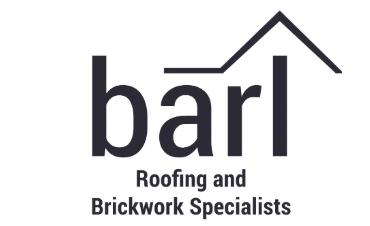
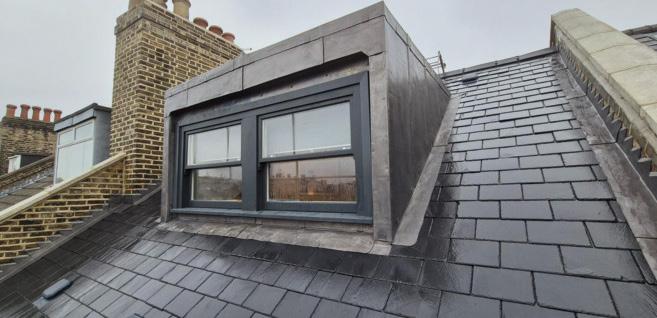
We are a traditional, family-run Roofing and Brickwork company based in Islington, with extensive experience across all styles of London properties.
Traditional London roofs
Natural slate and tile roofs
Brickwork
Repointing and cleaning
Parapet walls and coping stones
Fibreglass (GRP) flat roofs
Polyurethane roof coatings
Chimneys
Specialist Leadwork
Fascias and soffits
Asphalting
Front steps and paths
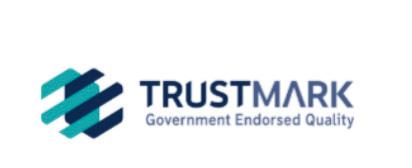

Velux, skylights and sash windows +44 (0) 800 130 3632 | contact@barl.co.uk | www.barl.co.uk Buildings and Restorations Ltd | Reg No 10634338


programme as participants. “It is a privelege just to be able to listen to people’s stories and build a bond with them,” Susan continues. “My hope is always that, at the end of our 10 sessions together, they’ve at least partially achieved what they wanted to achieve, which can be different for each person.”
Joseph, a recent participant, discovered the service through his housing provider. “I needed somewhere I could express myself,” he recalls. “When I met Gareth, what they offer sounded promising. Then I met Susan, and we just clicked. It was like talking to my older sister or my mum.”
Their sessions covered everything from memories of lost loved ones to everyday challenges. “Bereavement doesn’t stop other life stresses,” Susan continues. “We talk about financial burdens, family issues, and sometimes just current affairs. You never tell someone what to do – you let it happen.”
For Joseph, the experience was transformative. “My struggle’s not over, but this greatly helped. There were things I didn’t want to face that I can talk about now. It made me more determined to better myself and move forward, not dwelling on the past.”
As the service marks its tenth year, Gareth reflects on its impact: “We’re very blessed. We have wonderful volunteers, strong community connections, and the privilege of seeing people feel a bit less alone. That’s what it’s all about.”
To find out more about the Islington Bereavement Service, including to apply to volunteer or self-refer, email stjosephs. firstcontact@nhs.net call on 0300 303 0400 or visit the website: stjh.org.uk
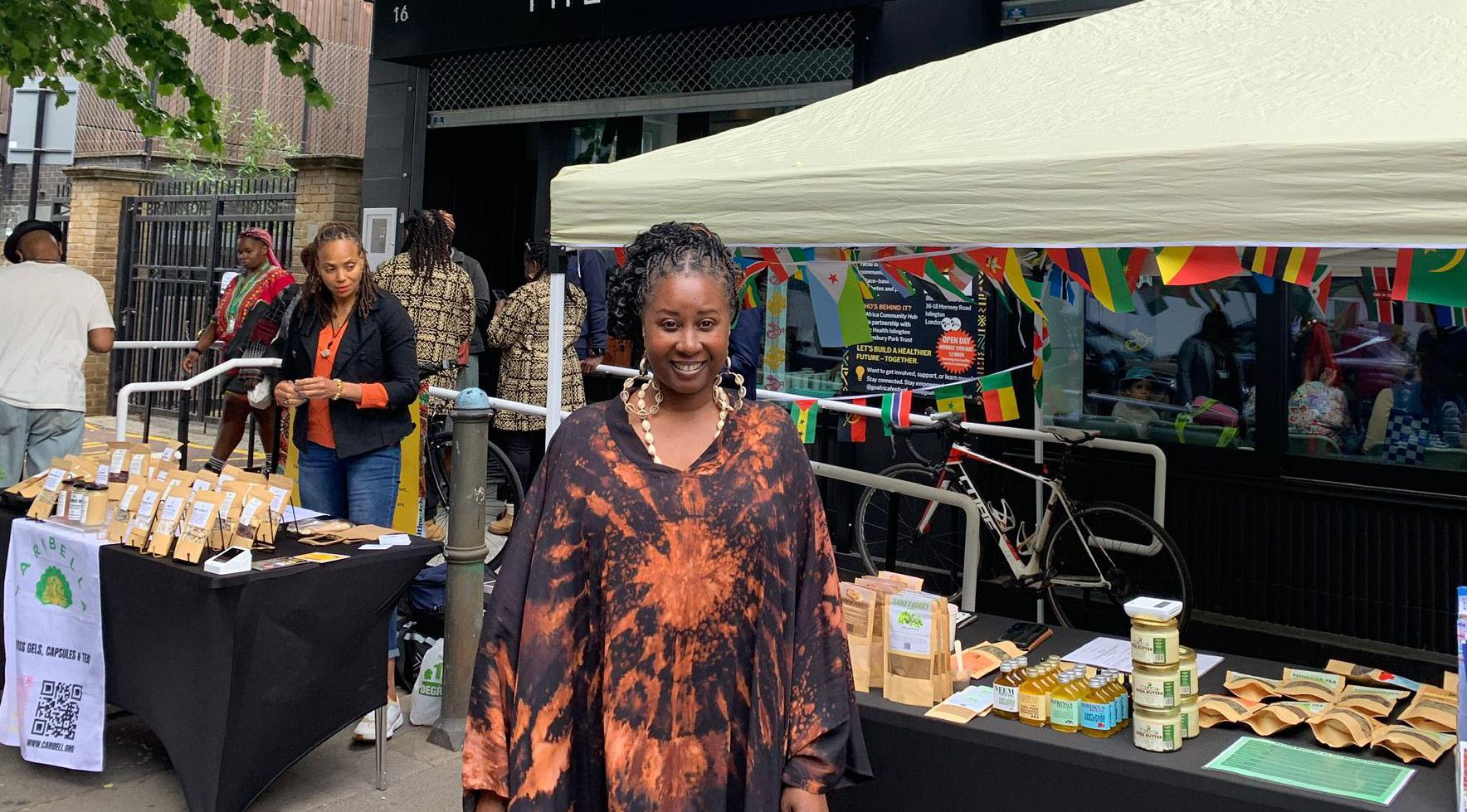
The Black Cultural Centre (BCC) opened in 2024 as a safe space for residents from Black African and Caribbean heritage to come together. During its first year, four different organisations were based at the centre for three months at a time. The third of these was Go Africa Community Hub CIC. We caught up with co-founder Anna to find out more about their residency
Why did you apply to run the BCC?
I know how important it is for Black communities to have a permanent, visible space. For too long, we have lacked safe places where our identity is celebrated, our issues are taken seriously, and our contributions are valued. The BCC gave us an anchor – a space where we could gather, heal, create, and feel proud.
What sort of services or events did you provide?
We curated a vibrant programme of events that combined art, culture, health, and policy, including a session reflecting on the ongoing impact of Covid; a family fun day with art, drumming, games and food; and a wellbeing event rooted in African traditions. It was a true community hub, hosting workshops, skill-sharing sessions, and regular meet-ups. The greatest benefit for many was belonging and we welcomed a wide cross-section of the community.
What was the best part of your experience?
The moments of joy: children creating art, women celebrating wellness, elders sharing wisdom, and artists thriving. These moments captured the spirit of Go Africa: joy, rooted in culture and community.
The residency may be ending, but our work continues. Because every community deserves a place to belong.
To find out what’s next for the BCC, visit the council website and sign up to the e-bulletin: islington.gov.uk/BlackCulturalCentre To learn more about Go Africa, visit: goafricaworkshop.co.uk
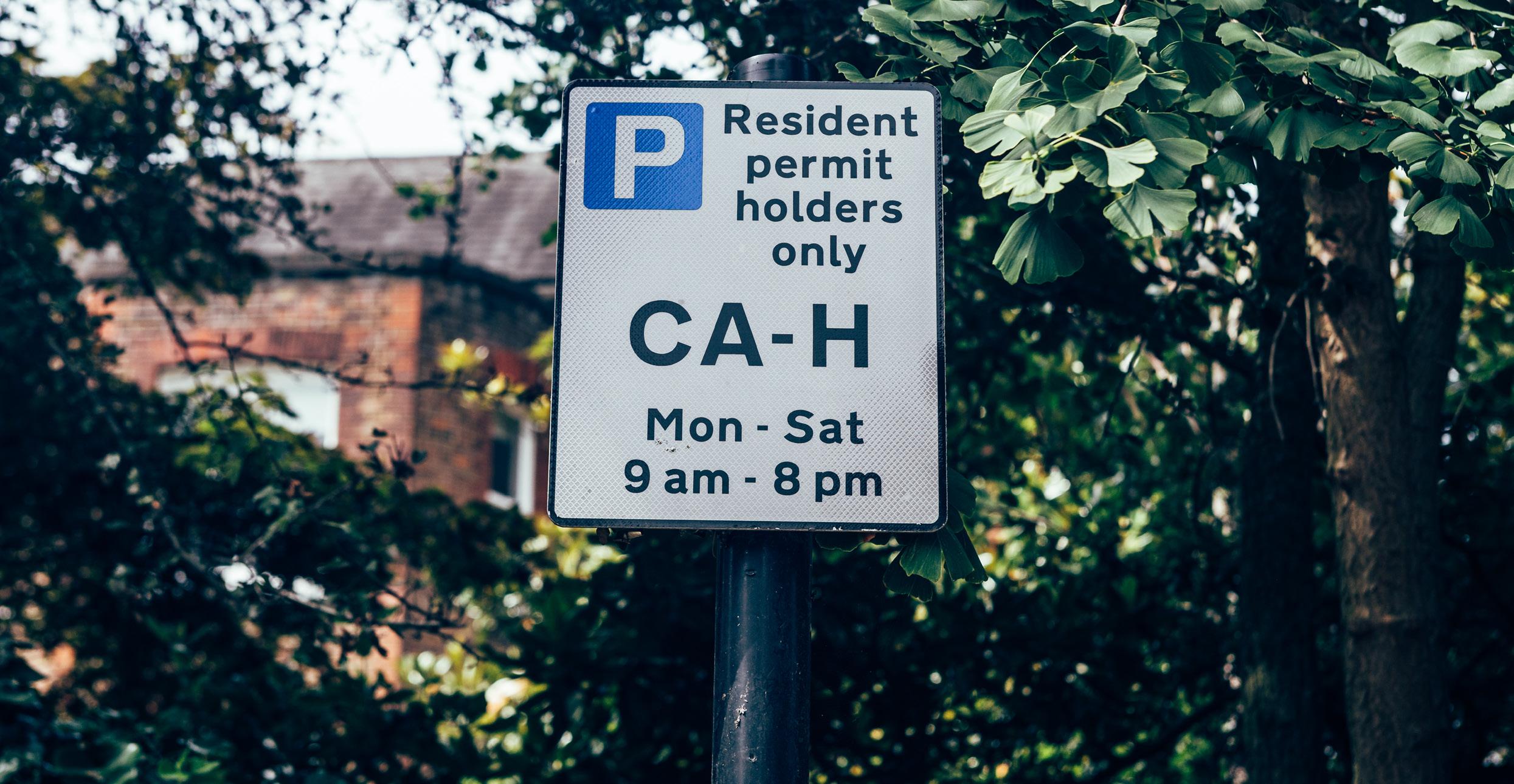
Islington Council has been clamping down — literally — on vehicles that cause problems in our neighbourhoods. These are often cars that rack up fines by ignoring traffic rules, aren’t properly registered, or are involved in parking fraud. Many of them slip through the net by avoiding payment or hiding their identity, making it hard for the council to take action.
But thanks to the new clamping initiative, the council has made real progress. Since December 2024, 293 vehicles have been clamped on public roads and housing estates, a number of which were impounded. These vehicle owners collectively owed more than £2 million in unpaid fines.
Clamping helps the council track down the owners, even when
they’ve tried to avoid detection. Once their details are known, the council can work with debt recovery teams to make sure they’re held accountable.
Some vehicles were repeatedly caught breaking the rules on CCTV. By working with contractors, the council has been able to clamp them when they stopped briefly on the street, cutting off their ability to keep offending.
The council doesn’t just release vehicles — it makes sure owners know about their outstanding fines and encourages them to set up payment plans. And it’s working: around 75 percent of clamped vehicles haven’t reoffended in Islington since being released. That’s a big win for everyone.
This work helps to keep Islington’s streets clearer by removing abandoned or nuisance vehicles. It makes roads safer for pedestrians, cyclists, and drivers and it ensures fairness, so rule-breakers don’t get away while others follow the rules.
To find out more about parking fraud and to report it, visit: Islington.gov.uk/ ParkingFraud
Islington Council’s blue badge scheme helps people with disabilities travel across the borough and get access to parking
People who fraudulently use these badges take away from the people who really need them.
The council is protecting those who truly rely on this vital scheme and taking blue badge theft and those misusing them seriously.
Fraudulent use of blue badges makes it harder for genuine badge holders to find parking, causes stress and inconvenience, and can even lead to damage or theft. It also costs the council money and puts pressure on traffic management.
The council is cracking down on blue badge parking fraud. Between April 2024 and March 2025, the council issued 770 fraud-related fines, impounded
100 vehicles, and 10 people were even prosecuted.
By tackling this fraud, the council is protecting vulnerable residents and making sure the system works for those who truly need it.
If you think someone is using a blue badge who shouldn’t be, call 020 7527 2000 or email ParkingFraud@islington.gov. uk. Or, to find out more visit: islington.gov.uk/BlueBadge